8
Fig. A8
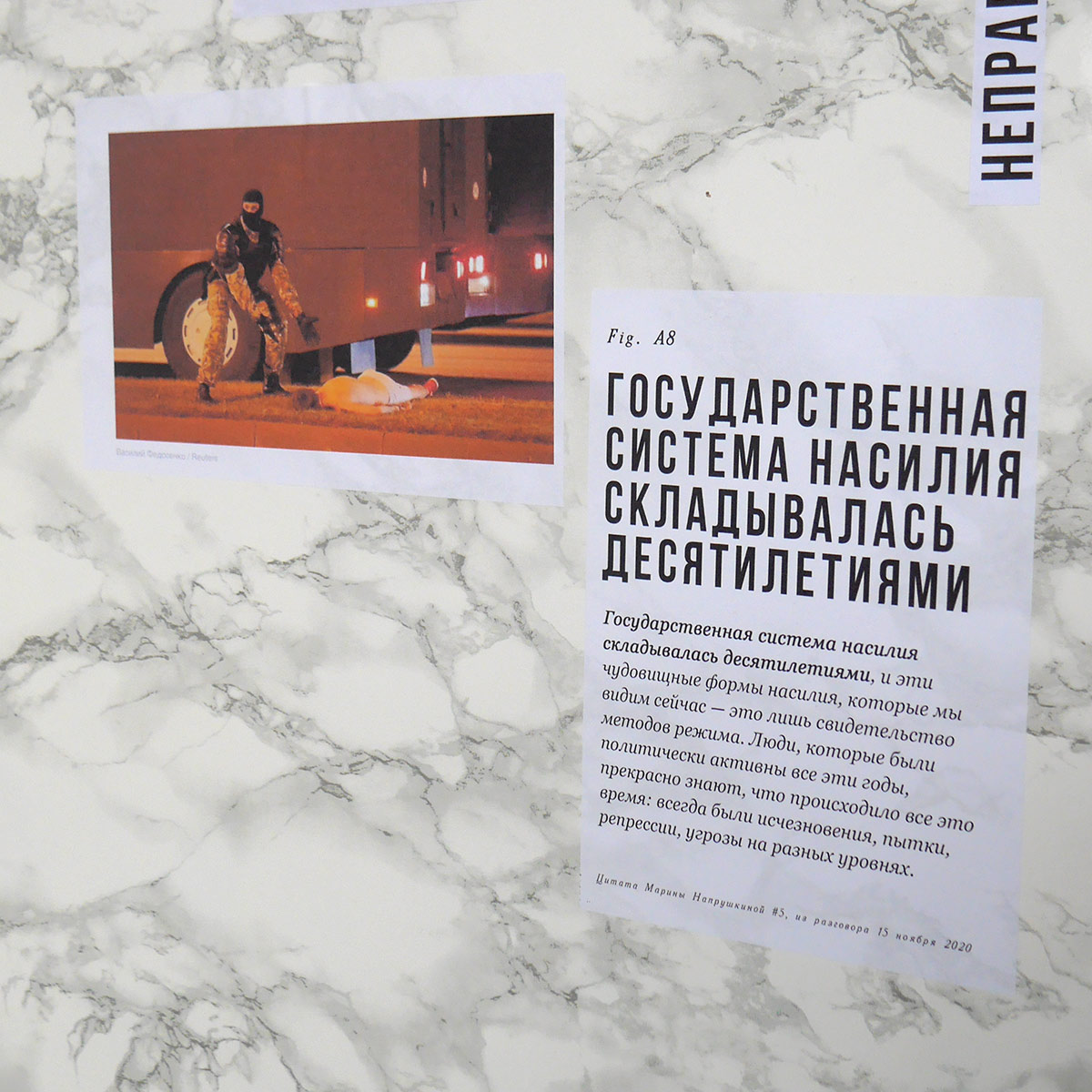
Quote by Marina Naprushkina #5
The state system of violence has been evolving for decades, and these monstrous forms of violence that we see now are just evidence of the regime's methods. People who have been politically active all these years know perfectly well what has been happening all this time: there have always been disappearances, torture, repression, and threats at various levels.
From a conversation on November 15, 2020
Screenshot: rbc.ru
The state system of violence has been evolving for decades
The state system of violence has been evolving for decades, and these monstrous forms of violence that we see now are just evidence of the regime's methods. People who have been politically active all these years know perfectly well what has been happening all this time: there have always been disappearances, torture, repression, and threats at various levels.
From a conversation on November 15, 2020
Screenshot: rbc.ru
Цитата Марины Напрушкиной #5
Государственная система насилия складывалась десятилетиями, и эти чудовищные формы насилия, которые мы видим сейчас — это лишь свидетельство методов режима. Люди, которые были политически активны все эти годы, прекрасно знают, что происходило все это время: всегда были исчезновения, пытки, репрессии, угрозы на разных уровнях.
Из разговора 15 ноября 2020 года
Скриншот: rbc.ru
Государственная система насилия складывалась десятилетиями
Государственная система насилия складывалась десятилетиями, и эти чудовищные формы насилия, которые мы видим сейчас — это лишь свидетельство методов режима. Люди, которые были политически активны все эти годы, прекрасно знают, что происходило все это время: всегда были исчезновения, пытки, репрессии, угрозы на разных уровнях.
Из разговора 15 ноября 2020 года
Скриншот: rbc.ru
Fig. B8
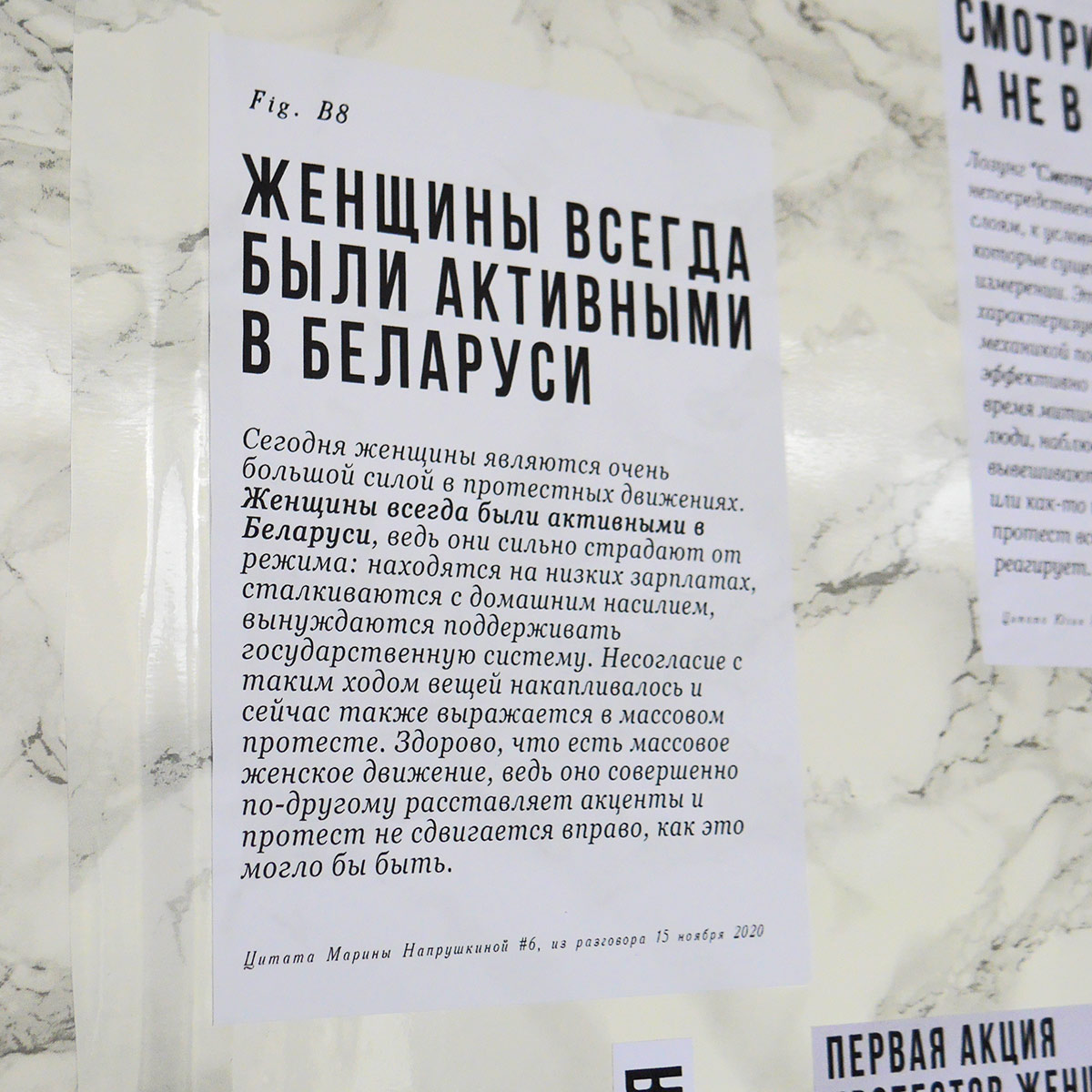
Quote by Marina Naprushkina #6
Today, women are a significant force in protest movements. Women have always been active in Belarus because they suffer greatly under the regime: they endure low salaries, face domestic violence, and are compelled to support the state system. Discontent with this state of affairs has been building up and is now finding expression in mass protests. It's great that there is a mass women's movement because it places emphasis completely differently, preventing the protest from shifting to the right, as it could.
From a conversation on November 15, 2020
Women have always been active in Belarus
Today, women are a significant force in protest movements. Women have always been active in Belarus because they suffer greatly under the regime: they endure low salaries, face domestic violence, and are compelled to support the state system. Discontent with this state of affairs has been building up and is now finding expression in mass protests. It's great that there is a mass women's movement because it places emphasis completely differently, preventing the protest from shifting to the right, as it could.
From a conversation on November 15, 2020
Цитата Марины Напрушкиной #6
Женщины всегда были активными в Беларуси
Сегодня женщины являются очень большой силой в протестных движениях. Женщины всегда были активными в Беларуси, ведь они сильно страдают от режима: находятся на низких зарплатах, сталкиваются с домашним насилием, вынуждаются поддерживать государственную систему. Несогласие с таким ходом вещей накапливалось и сейчас также выражается в массовом протесте. Здорово, что есть массовое женское движение, ведь оно совершенно по-другому расставляет акценты и протест не сдвигается вправо, как это могло бы быть.
Из разговора 15 ноября 2020 года
Женщины всегда были активными в Беларуси
Сегодня женщины являются очень большой силой в протестных движениях. Женщины всегда были активными в Беларуси, ведь они сильно страдают от режима: находятся на низких зарплатах, сталкиваются с домашним насилием, вынуждаются поддерживать государственную систему. Несогласие с таким ходом вещей накапливалось и сейчас также выражается в массовом протесте. Здорово, что есть массовое женское движение, ведь оно совершенно по-другому расставляет акценты и протест не сдвигается вправо, как это могло бы быть.
Из разговора 15 ноября 2020 года
Fig. C8
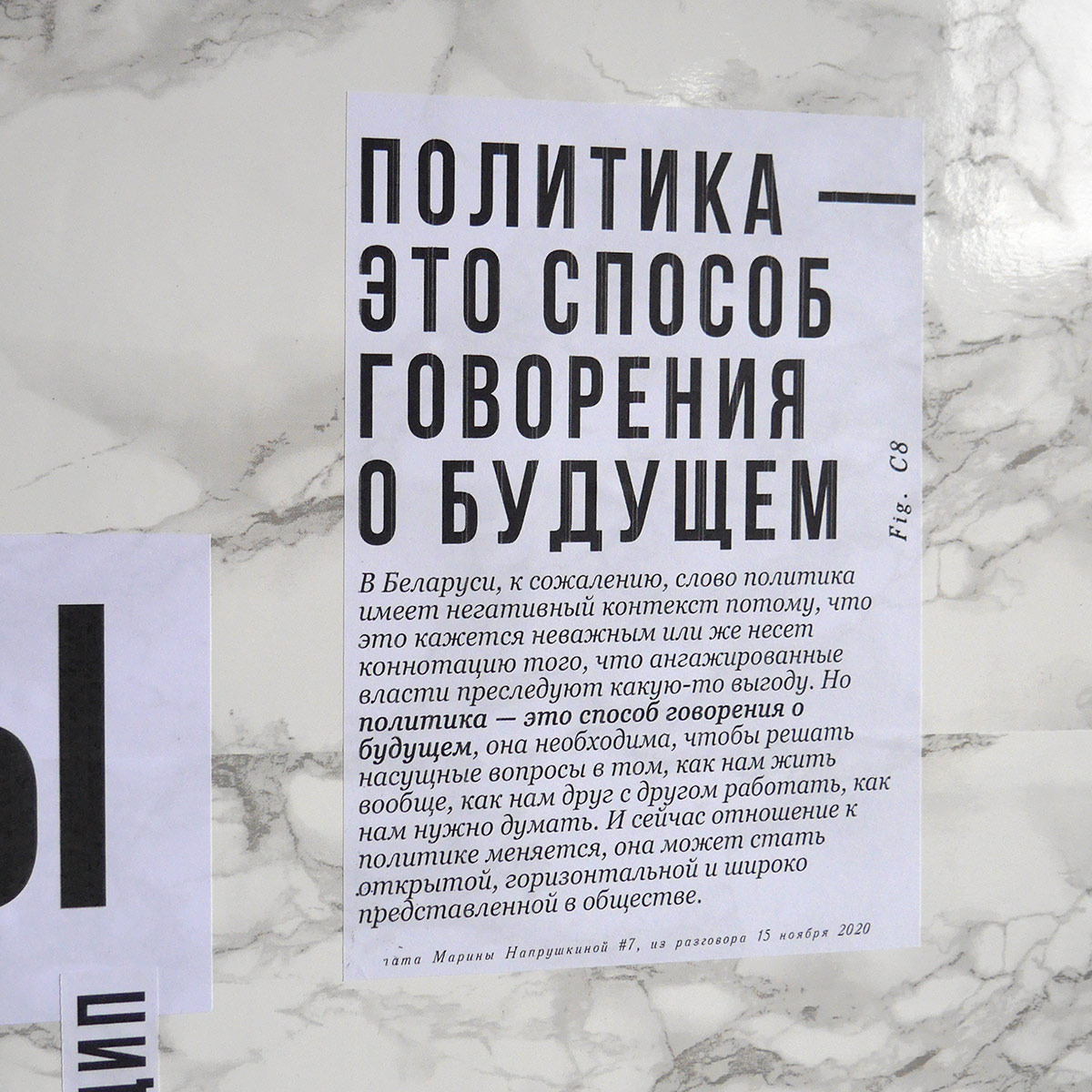
Quote by Marina Naprushkina #7
In Belarus, unfortunately, the word "politics" has a negative connotation because it seems unimportant or carries the connotation that the authorities pursuing some gain are involved. However, politics is a way of discussing the future; it is necessary to address pressing issues in how we live, work with each other, and think. And now, attitudes towards politics are changing; it can become open, horizontal, and widely represented in society.
From a conversation on November 15, 2020
Politics is a way of discussing the future
In Belarus, unfortunately, the word "politics" has a negative connotation because it seems unimportant or carries the connotation that the authorities pursuing some gain are involved. However, politics is a way of discussing the future; it is necessary to address pressing issues in how we live, work with each other, and think. And now, attitudes towards politics are changing; it can become open, horizontal, and widely represented in society.
From a conversation on November 15, 2020
Цитата Марины Напрушкиной #7
В Беларуси, к сожалению, слово политика имеет негативный контекст потому, что это кажется неважным или же несет коннотацию того, что ангажированные власти преследуют какую-то выгоду. Но политика — это способ говорения о будущем, она необходима, чтобы решать насущные вопросы в том, как нам жить вообще, как нам друг с другом работать, как нам нужно думать. И сейчас отношение к политике меняется, она может стать открытой, горизонтальной и широко представленной в обществе.
Из разговора 15 ноября 2020 года
Политика — это способ говорения о будущем
В Беларуси, к сожалению, слово политика имеет негативный контекст потому, что это кажется неважным или же несет коннотацию того, что ангажированные власти преследуют какую-то выгоду. Но политика — это способ говорения о будущем, она необходима, чтобы решать насущные вопросы в том, как нам жить вообще, как нам друг с другом работать, как нам нужно думать. И сейчас отношение к политике меняется, она может стать открытой, горизонтальной и широко представленной в обществе.
Из разговора 15 ноября 2020 года
Fig. D8
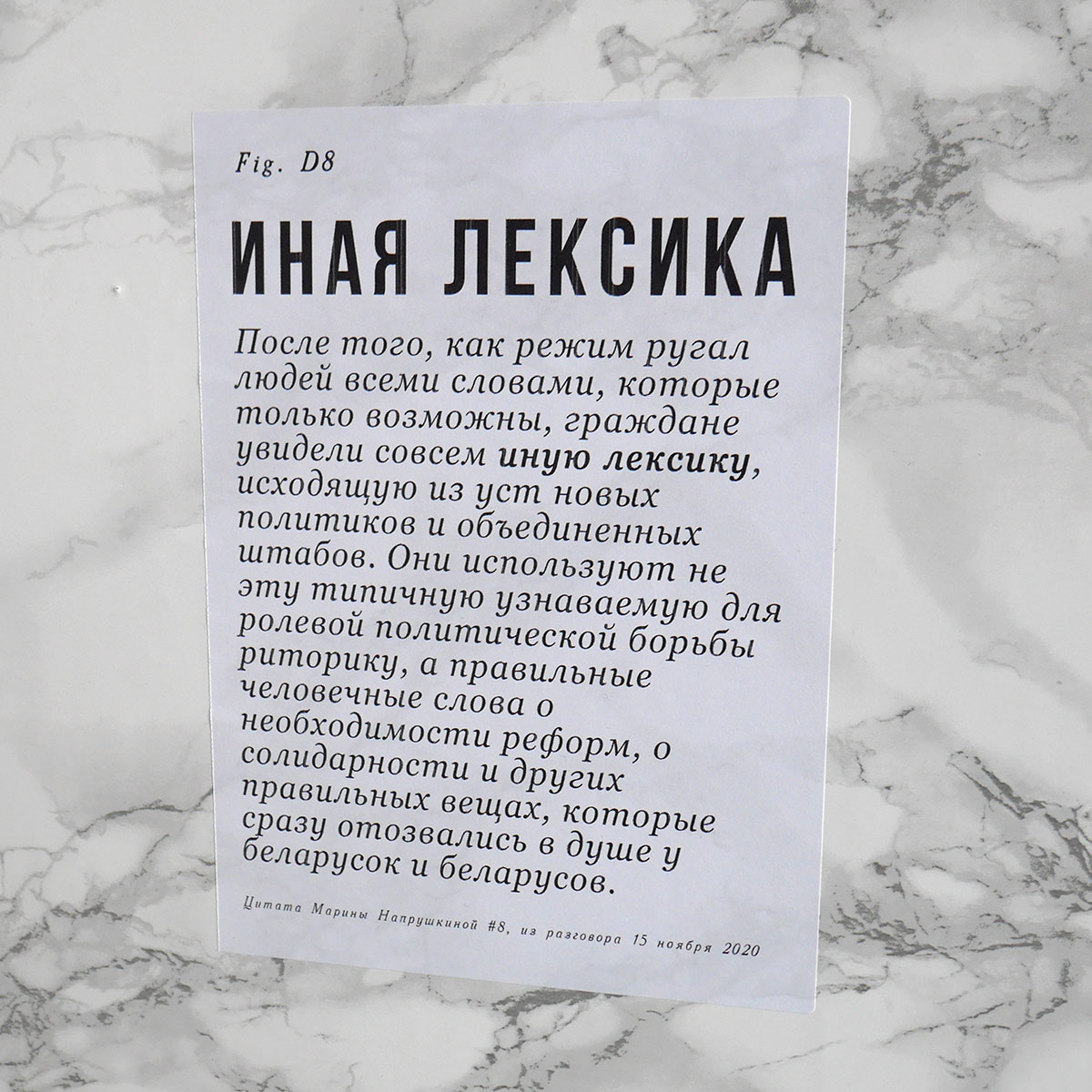
Quote by Marina Naprushkina #8
After the regime used every possible derogatory term against the people, citizens witnessed a completely different vocabulary emerging from the mouths of new politicians and united headquarters. They use not the typical recognizable rhetoric of political struggle, but the right human words about the need for reforms, solidarity, and other correct things that immediately resonated with the souls of Belarusians.
From a conversation on November 15, 2020
Different vocabulary
After the regime used every possible derogatory term against the people, citizens witnessed a completely different vocabulary emerging from the mouths of new politicians and united headquarters. They use not the typical recognizable rhetoric of political struggle, but the right human words about the need for reforms, solidarity, and other correct things that immediately resonated with the souls of Belarusians.
From a conversation on November 15, 2020
Цитата Марины Напрушкиной #8
После того, как режим ругал людей всеми словами, которые только возможны, граждане увидели совсем иную лексику, исходящую из уст новых политиков и объединенных штабов. Они используют не эту типичную узнаваемую для ролевой политической борьбы риторику, а правильные человечные слова о необходимости реформ, о солидарности и других правильных вещах, которые сразу отозвались в душе у беларусок и беларусов.
Из разговора 15 ноября 2020 года
Иная лексика
После того, как режим ругал людей всеми словами, которые только возможны, граждане увидели совсем иную лексику, исходящую из уст новых политиков и объединенных штабов. Они используют не эту типичную узнаваемую для ролевой политической борьбы риторику, а правильные человечные слова о необходимости реформ, о солидарности и других правильных вещах, которые сразу отозвались в душе у беларусок и беларусов.
Из разговора 15 ноября 2020 года
Fig. E8
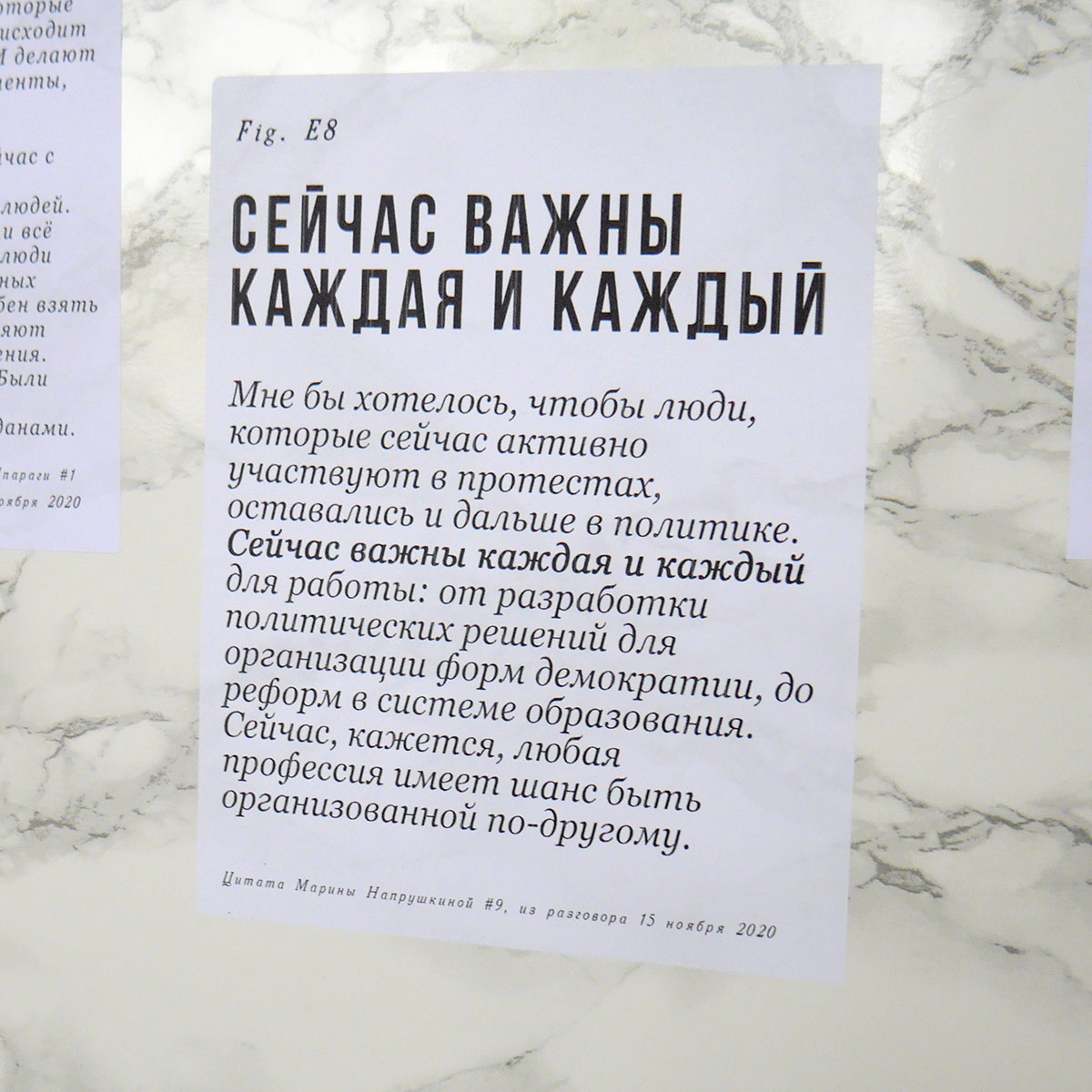
Quote by Marina Naprushkina #9
I would like people who are currently actively involved in the protests to continue their engagement in politics. Every individual is important for the work ahead, from developing political solutions to organizing democratic forms, to reforms in the education system. It seems that now every profession has a chance to be organized differently.
From a conversation on November 15, 2020
Every individual is important
I would like people who are currently actively involved in the protests to continue their engagement in politics. Every individual is important for the work ahead, from developing political solutions to organizing democratic forms, to reforms in the education system. It seems that now every profession has a chance to be organized differently.
From a conversation on November 15, 2020
Цитата Марины Напрушкиной #9
Мне бы хотелось, чтобы люди, которые сейчас активно участвуют в протестах, оставались и дальше в политике. Сейчас важны каждая и каждый для работы: от разработки политических решений для организации форм демократии, до реформ в системе образования. Сейчас, кажется, любая профессия имеет шанс быть организованной по-другому.
Из разговора 15 ноября 2020 года
Сейчас важны каждая и каждый
Мне бы хотелось, чтобы люди, которые сейчас активно участвуют в протестах, оставались и дальше в политике. Сейчас важны каждая и каждый для работы: от разработки политических решений для организации форм демократии, до реформ в системе образования. Сейчас, кажется, любая профессия имеет шанс быть организованной по-другому.
Из разговора 15 ноября 2020 года
Fig. F8
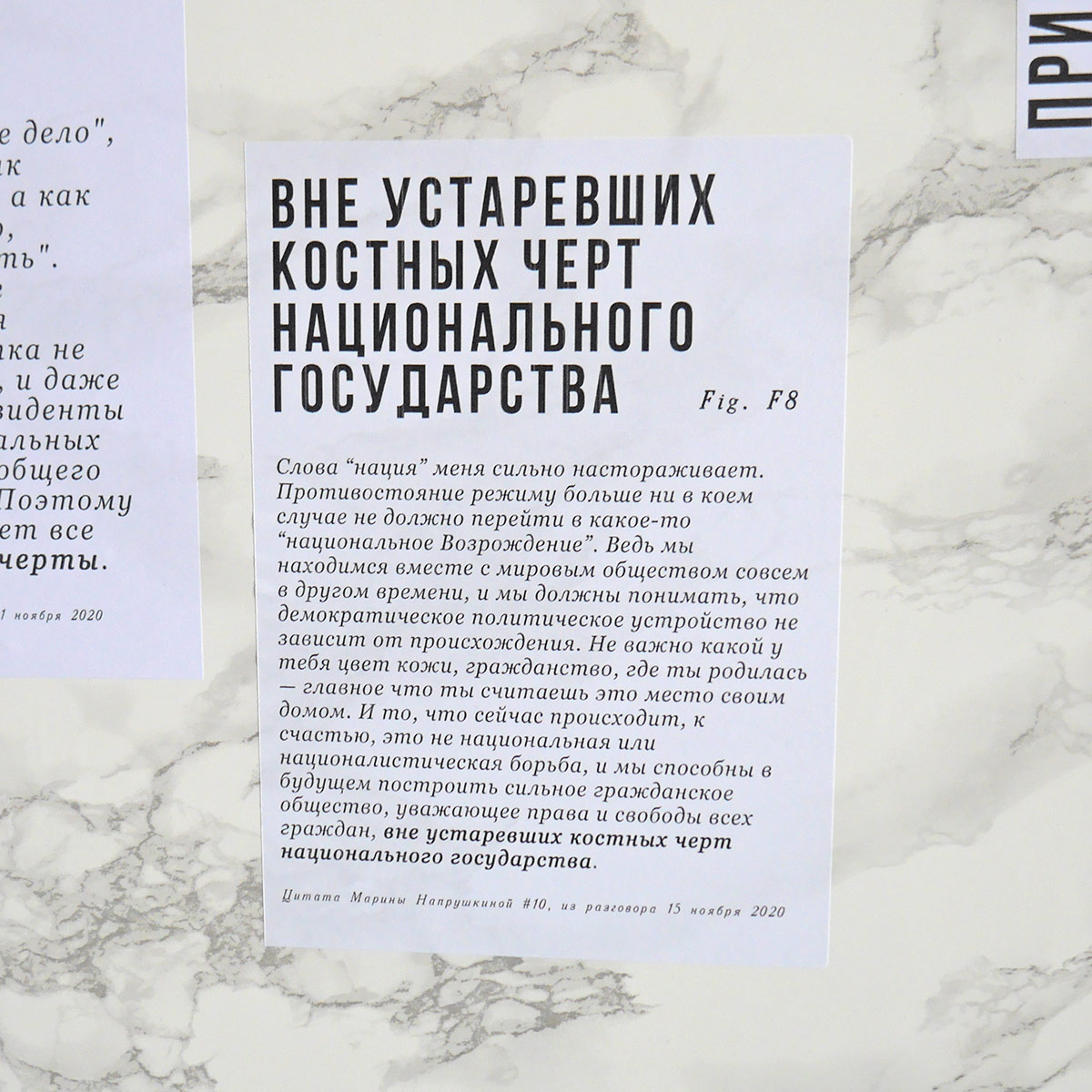
Quote by Marina Naprushkina #10
The word "nation" greatly alarms me. Opposition to the regime must never, under any circumstances, turn into some kind of "national revival." After all, we are living in a completely different time along with the global community, and we must understand that democratic political structure is not determined by ancestry. It doesn't matter what your skin color is, your citizenship, or where you were born - what matters is that you consider this place your home. Fortunately, what is happening now is not a national or nationalist struggle, and we are capable of building a strong civil society in the future, respecting the rights and freedoms of all citizens, beyond the outdated boundaries of national identity.
From a conversation on November 15, 2020
Beyond the outdated boundaries of national identity
The word "nation" greatly alarms me. Opposition to the regime must never, under any circumstances, turn into some kind of "national revival." After all, we are living in a completely different time along with the global community, and we must understand that democratic political structure is not determined by ancestry. It doesn't matter what your skin color is, your citizenship, or where you were born - what matters is that you consider this place your home. Fortunately, what is happening now is not a national or nationalist struggle, and we are capable of building a strong civil society in the future, respecting the rights and freedoms of all citizens, beyond the outdated boundaries of national identity.
From a conversation on November 15, 2020
Цитата Марины Напрушкиной #10
Слова “нация” меня сильно настораживает. Противостояние режиму больше ни в коем случае не должно перейти в какое-то “национальное Возрождение”. Ведь мы находимся вместе с мировым обществом совсем в другом времени, и мы должны понимать, что демократическое политическое устройство не зависит от происхождения. Не важно какой у тебя цвет кожи, гражданство, где ты родилась — главное что ты считаешь это место своим домом. И то, что сейчас происходит, к счастью, это не национальная или националистическая борьба, и мы способны в будущем построить сильное гражданское общество, уважающее права и свободы всех граждан, вне устаревших костных черт национального государства.
Из разговора 15 ноября 2020 года
Вне устаревших костных черт национального государства
Слова “нация” меня сильно настораживает. Противостояние режиму больше ни в коем случае не должно перейти в какое-то “национальное Возрождение”. Ведь мы находимся вместе с мировым обществом совсем в другом времени, и мы должны понимать, что демократическое политическое устройство не зависит от происхождения. Не важно какой у тебя цвет кожи, гражданство, где ты родилась — главное что ты считаешь это место своим домом. И то, что сейчас происходит, к счастью, это не национальная или националистическая борьба, и мы способны в будущем построить сильное гражданское общество, уважающее права и свободы всех граждан, вне устаревших костных черт национального государства.
Из разговора 15 ноября 2020 года
Fig. G8
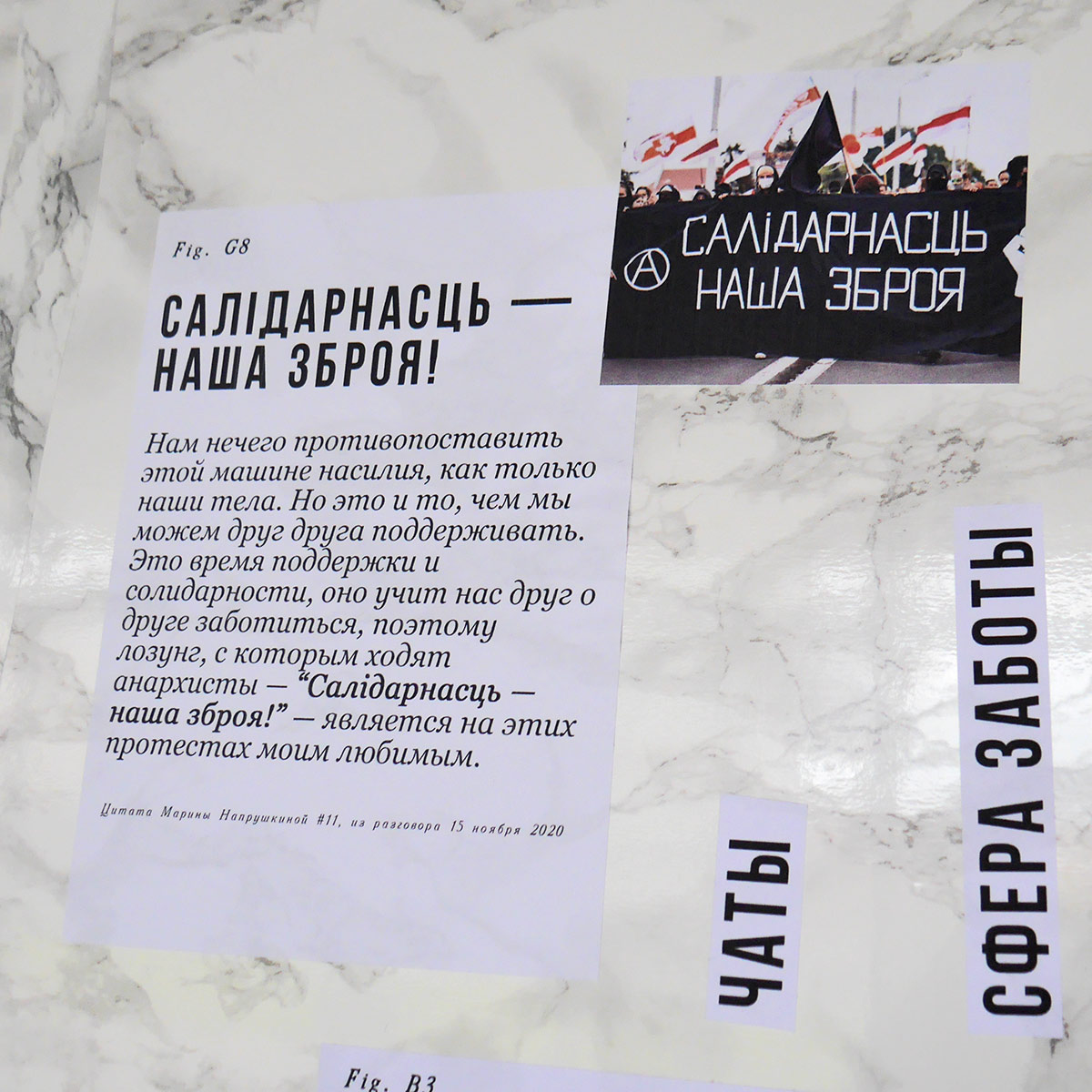
Quote by Marina Naprushkina #11
We have nothing to oppose this machine of violence except our own bodies. But this is also what we can use to support each other. This is a time of support and solidarity, it teaches us to care for each other, so the slogan used by anarchists - "Solidarity is our weapon!" - is my favorite at these protests.
From a conversation on November 15, 2020
Solidarity is our weapon!"
We have nothing to oppose this machine of violence except our own bodies. But this is also what we can use to support each other. This is a time of support and solidarity, it teaches us to care for each other, so the slogan used by anarchists - "Solidarity is our weapon!" - is my favorite at these protests.
From a conversation on November 15, 2020
Цитата Марины Напрушкиной #11
Нам нечего противопоставить этой машине насилия, как только наши тела. Но это и то, чем мы можем друг друга поддерживать. Это время поддержки и солидарности, оно учит нас друг о друге заботиться, поэтому лозунг, с которым ходят анархисты — “Салідарнасць — наша зброя!” — является на этих протестах моим любимым.
Из разговора 15 ноября 2020 года
Салідарнасць — наша зброя!
Нам нечего противопоставить этой машине насилия, как только наши тела. Но это и то, чем мы можем друг друга поддерживать. Это время поддержки и солидарности, оно учит нас друг о друге заботиться, поэтому лозунг, с которым ходят анархисты — “Салідарнасць — наша зброя!” — является на этих протестах моим любимым.
Из разговора 15 ноября 2020 года
Fig. H8

Volha Hapeyeva
Volha Hapeyeva is an award-winning Belarusian poet. Her works have been translated into more than 10 languages. She has had poems published in the USA, Austria, Germany, Poland, Russia, Georgia, Lithuania, and other countries. She writes poetry, prose and drama, as well as occasional books for children. Volha Hapeyeva has published a number of books to date, and has participated in numerous literary festivals and conferences, and international residency scholarships in Austria (a.o. City Writer of Graz 2019/2020), Germany (a.o. LCB 2009, 2018; Villa Waldberta 2020), Switzerland, Latvia, etc. She collaborates with electronic musicians and visual artists to create audio-visual performances. A member of the Belarusian PEN Centre and the Independent Union of Belarusian Writers’, Volha also translates poetry. She holds a PhD in linguistics; her research is in the fields of comparative linguistics, philosophy of language, sociology of the body, and gender issues in culture and literature.
Lives and works in Minsk.
hapeyeva.org
Контрибьюторка #14
Вольга Гапеева – аўтарка кніг “Кэмэл-трэвэл”, “Словы якія са мной адбыліся”, “Граматыка снегу”, “Дзве Авечкі”, “Сумны суп”, “(в)ядомыя гісторыі” і інш. Стыпендыятка міжнародных праграм для пісьменнікаў і перакладчыкаў (Аўстрыя, Нямеччына, Латвія, Швейцарыя), удзельніца шматлікіх міжнародных канферэнцый і літаратурных фестываляў (Славенія, Германія, Калумбія, Чэхія, Швейцарыя, Польшча і інш.). Творы Вольгі Гапеевай перакладзеныя на больш як 10 моваў свету. Аўтарка супрацоўнічае з электроннымі музыкамі, выступае з аўдыёвізуальнымі перформансамі. Сябра беларускага ПЭН-цэнтра і Саюза беларускіх пісьменнікаў. Мае ступень кандыдата навук, дацэнт. Займаецца літаратурным перакладам, даследаваннямі ў галіне філасофіі мовы, кампаратыўнай лінгвістыкі, сацыялогіі цела.
Жыве і працуе ў Менску.
hapeyeva.org
Вольга Гапеева
Вольга Гапеева – аўтарка кніг “Кэмэл-трэвэл”, “Словы якія са мной адбыліся”, “Граматыка снегу”, “Дзве Авечкі”, “Сумны суп”, “(в)ядомыя гісторыі” і інш. Стыпендыятка міжнародных праграм для пісьменнікаў і перакладчыкаў (Аўстрыя, Нямеччына, Латвія, Швейцарыя), удзельніца шматлікіх міжнародных канферэнцый і літаратурных фестываляў (Славенія, Германія, Калумбія, Чэхія, Швейцарыя, Польшча і інш.). Творы Вольгі Гапеевай перакладзеныя на больш як 10 моваў свету. Аўтарка супрацоўнічае з электроннымі музыкамі, выступае з аўдыёвізуальнымі перформансамі. Сябра беларускага ПЭН-цэнтра і Саюза беларускіх пісьменнікаў. Мае ступень кандыдата навук, дацэнт. Займаецца літаратурным перакладам, даследаваннямі ў галіне філасофіі мовы, кампаратыўнай лінгвістыкі, сацыялогіі цела.
Жыве і працуе ў Менску.
hapeyeva.org
Fig. I8

Quote by Volha Hapeyeva #1
The level of aggression demonstrated by the authorities struck me deeply. I compare today's situation in Belarus to breaking free from abusive relationships. Metaphorically, the people and the country can be compared to a partner leaving such relationships, while the abuser, represented by the government, refuses to let them go. Now, all these manipulations in rhetoric and practice, typical methods of control, are very recognizable. If you open any text dedicated to abusive relationships, they resonate so closely with the Belarusian reality.
From a conversation on November 16, 2020
The metaphor of abusive relationships
The level of aggression demonstrated by the authorities struck me deeply. I compare today's situation in Belarus to breaking free from abusive relationships. Metaphorically, the people and the country can be compared to a partner leaving such relationships, while the abuser, represented by the government, refuses to let them go. Now, all these manipulations in rhetoric and practice, typical methods of control, are very recognizable. If you open any text dedicated to abusive relationships, they resonate so closely with the Belarusian reality.
From a conversation on November 16, 2020
Цитата Воли Гапеевой #1
Мяне ўразіў той узровень агрэсіі, якая прадэманстравала ўлада. Я параўноўваю сённяшнюю сітуацыю ў Беларусі з выхадам з аб’юзіўных стасункаў. Можна метафарычна параўноўваць народ і краіну з партнёркай або партнёрам, якая ці які выходзіць з падобных стасункаў, і аб’юзер у асобе ўлады не жадае яе або яго адпускаць. І зараз вельмі добра счытваюцца ўсе гэтыя маніпуляцыі ў рыторыцы і на практыцы, тыповыя метады кантролю. Калі адкрыць любы тэкст прысвечаны аб’юзіўным стасункам, яны як пад капірку супадаюць з беларускімі рэаліямі.
Из разговора 16 ноября 2020 года
Метафара аб’юзіўных стасункаў
Мяне ўразіў той узровень агрэсіі, якая прадэманстравала ўлада. Я параўноўваю сённяшнюю сітуацыю ў Беларусі з выхадам з аб’юзіўных стасункаў. Можна метафарычна параўноўваць народ і краіну з партнёркай або партнёрам, якая ці які выходзіць з падобных стасункаў, і аб’юзер у асобе ўлады не жадае яе або яго адпускаць. І зараз вельмі добра счытваюцца ўсе гэтыя маніпуляцыі ў рыторыцы і на практыцы, тыповыя метады кантролю. Калі адкрыць любы тэкст прысвечаны аб’юзіўным стасункам, яны як пад капірку супадаюць з беларускімі рэаліямі.
Из разговора 16 ноября 2020 года
Fig. J8
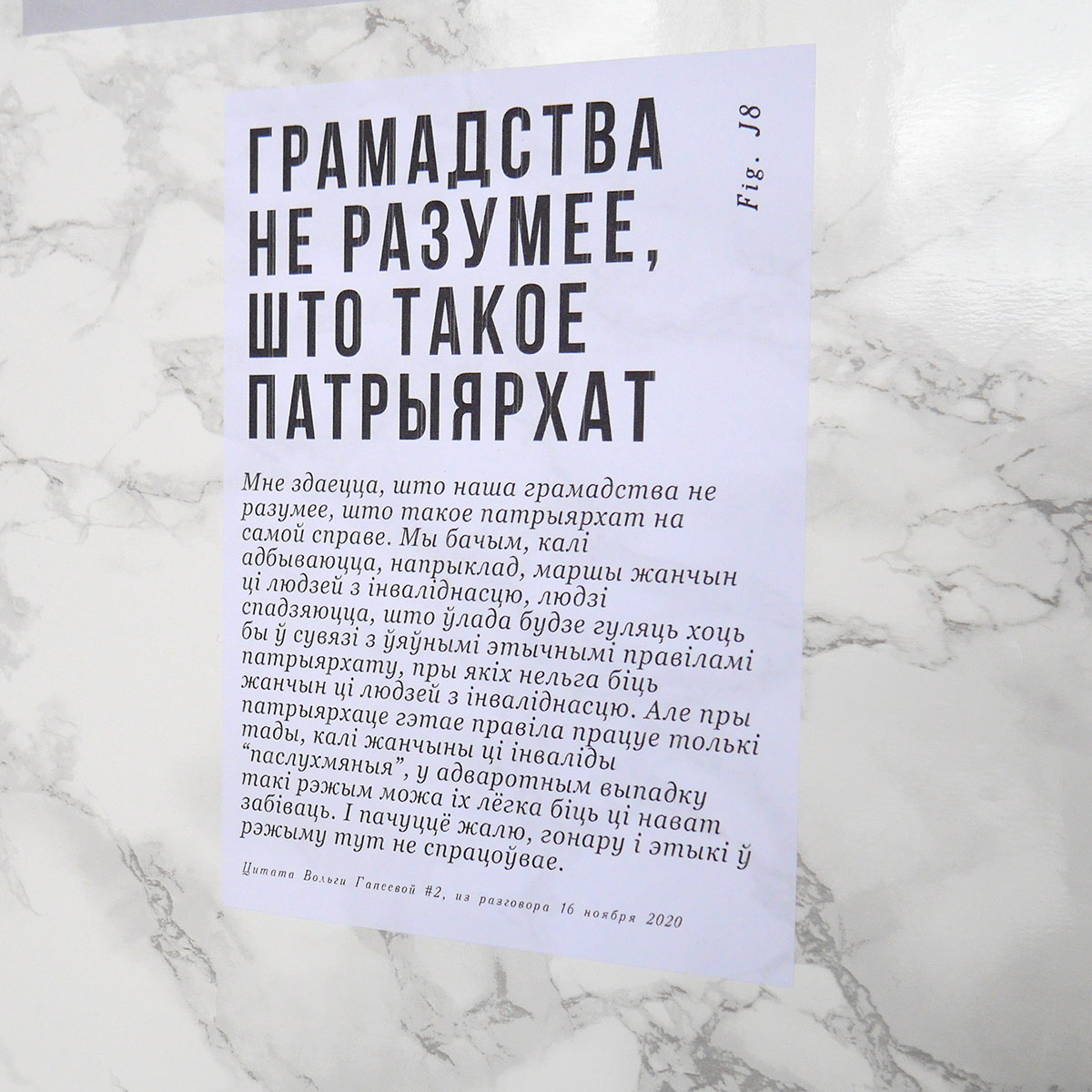
Quote by Volha Hapeyeva #2
It seems to me that our society doesn't really understand what patriarchy is in essence. We see, for example, women's marches or protests by people with disabilities, and people hope that the authorities will at least adhere to some overt ethical rules of patriarchy, where it's unacceptable to hit women or people with disabilities. But under patriarchy, this rule only applies when women or disabled individuals are "submissive"; otherwise, such a regime can easily beat or even kill them. And the sense of pity, honor, and ethics in the regime doesn't apply here.
From a conversation on November 16, 2020
Our society doesn't really understand what patriarchy is
It seems to me that our society doesn't really understand what patriarchy is in essence. We see, for example, women's marches or protests by people with disabilities, and people hope that the authorities will at least adhere to some overt ethical rules of patriarchy, where it's unacceptable to hit women or people with disabilities. But under patriarchy, this rule only applies when women or disabled individuals are "submissive"; otherwise, such a regime can easily beat or even kill them. And the sense of pity, honor, and ethics in the regime doesn't apply here.
From a conversation on November 16, 2020
Цитата Воли Гапеевой #2
Мне здаецца, што наша грамадства не разумее, што такое патрыярхат на самой справе. Мы бачым, калі адбываюцца, напрыклад, маршы жанчын ці людзей з інваліднасцю, людзі спадзяюцца, што ўлада будзе гуляць хоць бы ў сувязі з ўяўнымі этычнымі правіламі патрыярхату, пры якіх нельга біць жанчын ці людзей з інваліднасцю. Але пры патрыярхаце гэтае правіла працуе толькі тады, калі жанчыны ці інваліды “паслухмяныя”, у адваротным выпадку такі рэжым можа іх лёгка біць ці нават забіваць. І пачуццё жалю, гонару і этыкі ў рэжыму тут не спрацоўвае.
Из разговора 16 ноября 2020 года
Грамадства не разумее, што такое патрыярхат
Мне здаецца, што наша грамадства не разумее, што такое патрыярхат на самой справе. Мы бачым, калі адбываюцца, напрыклад, маршы жанчын ці людзей з інваліднасцю, людзі спадзяюцца, што ўлада будзе гуляць хоць бы ў сувязі з ўяўнымі этычнымі правіламі патрыярхату, пры якіх нельга біць жанчын ці людзей з інваліднасцю. Але пры патрыярхаце гэтае правіла працуе толькі тады, калі жанчыны ці інваліды “паслухмяныя”, у адваротным выпадку такі рэжым можа іх лёгка біць ці нават забіваць. І пачуццё жалю, гонару і этыкі ў рэжыму тут не спрацоўвае.
Из разговора 16 ноября 2020 года
Fig. K8
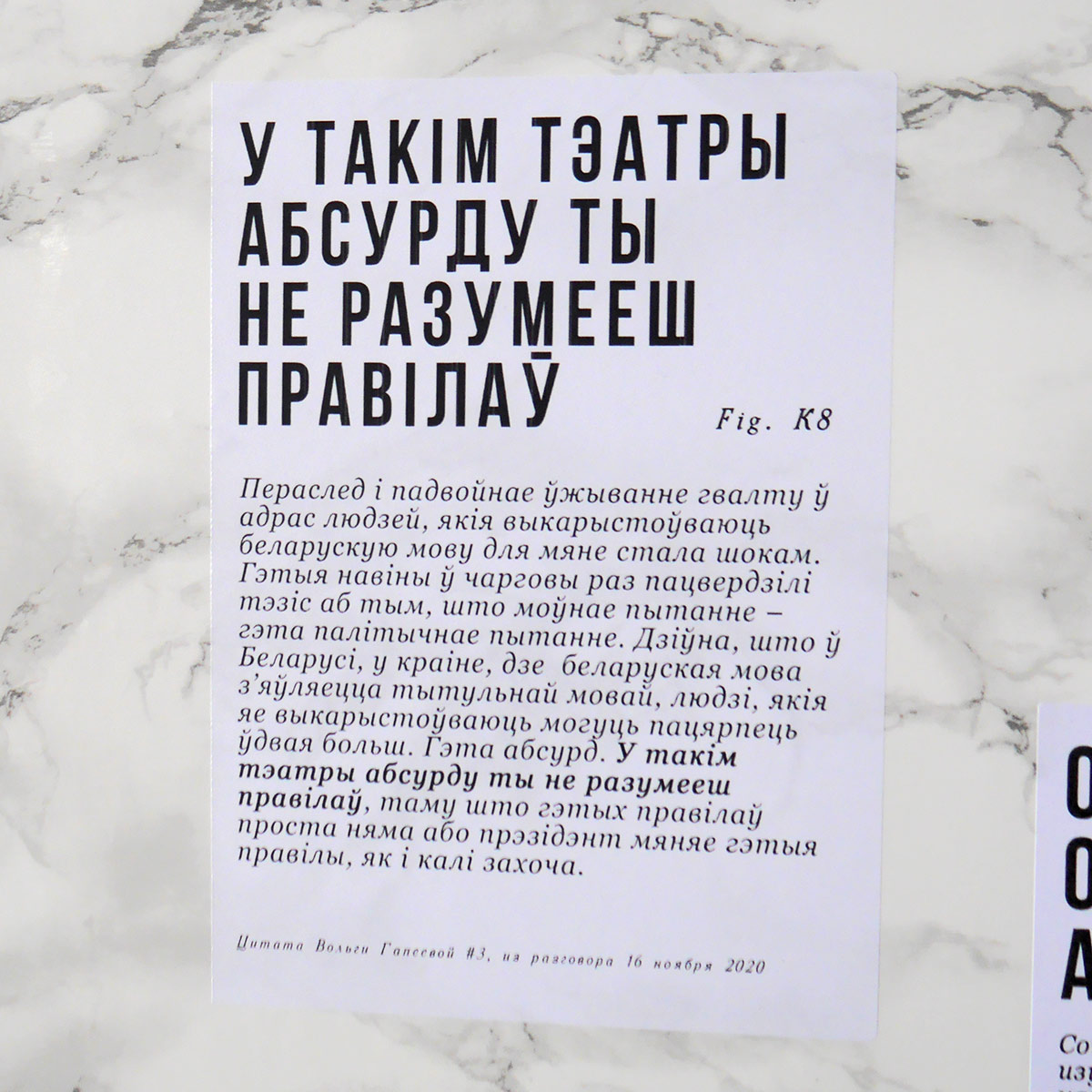
Quote by Volha Hapeyeva #3
The persecution and double standards regarding the use of the Belarusian language came as a shock to me. These news once again confirmed the thesis that the language issue is a political one. It's strange that in Belarus, a country where Belarusian is the official language, people who use it can suffer twice as much. It's absurd. In such a theater of the absurd, you don't understand the rules because there are simply no rules, or the president changes these rules as he pleases.
From a conversation on November 16, 2020
In such a theater of the absurd, you don't understand the rules
The persecution and double standards regarding the use of the Belarusian language came as a shock to me. These news once again confirmed the thesis that the language issue is a political one. It's strange that in Belarus, a country where Belarusian is the official language, people who use it can suffer twice as much. It's absurd. In such a theater of the absurd, you don't understand the rules because there are simply no rules, or the president changes these rules as he pleases.
From a conversation on November 16, 2020
Цитата Воли Гапеевой #3
Пераслед і падвойнае ўжыванне гвалту ў адрас людзей, якія выкарыстоўваюць беларускую мову для мяне стала шокам. Гэтыя навіны ў чарговы раз пацвердзілі тэзіс аб тым, што моўнае пытанне – гэта палітычнае пытанне. Дзіўна, што ў Беларусі, у краіне, дзе беларуская мова з’яўляецца тытульнай мовай, людзі, якія яе выкарыстоўваюць могуць пацярпець ўдвая больш. Гэта абсурд. У такім тэатры абсурду ты не разумееш правілаў, таму што гэтых правілаў проста няма або прэзідэнт мяняе гэтыя правілы, як і калі захоча.
Из разговора 16 ноября 2020 года
У такім тэатры абсурду ты не разумееш правілаў
Пераслед і падвойнае ўжыванне гвалту ў адрас людзей, якія выкарыстоўваюць беларускую мову для мяне стала шокам. Гэтыя навіны ў чарговы раз пацвердзілі тэзіс аб тым, што моўнае пытанне – гэта палітычнае пытанне. Дзіўна, што ў Беларусі, у краіне, дзе беларуская мова з’яўляецца тытульнай мовай, людзі, якія яе выкарыстоўваюць могуць пацярпець ўдвая больш. Гэта абсурд. У такім тэатры абсурду ты не разумееш правілаў, таму што гэтых правілаў проста няма або прэзідэнт мяняе гэтыя правілы, як і калі захоча.
Из разговора 16 ноября 2020 года
Fig. L8
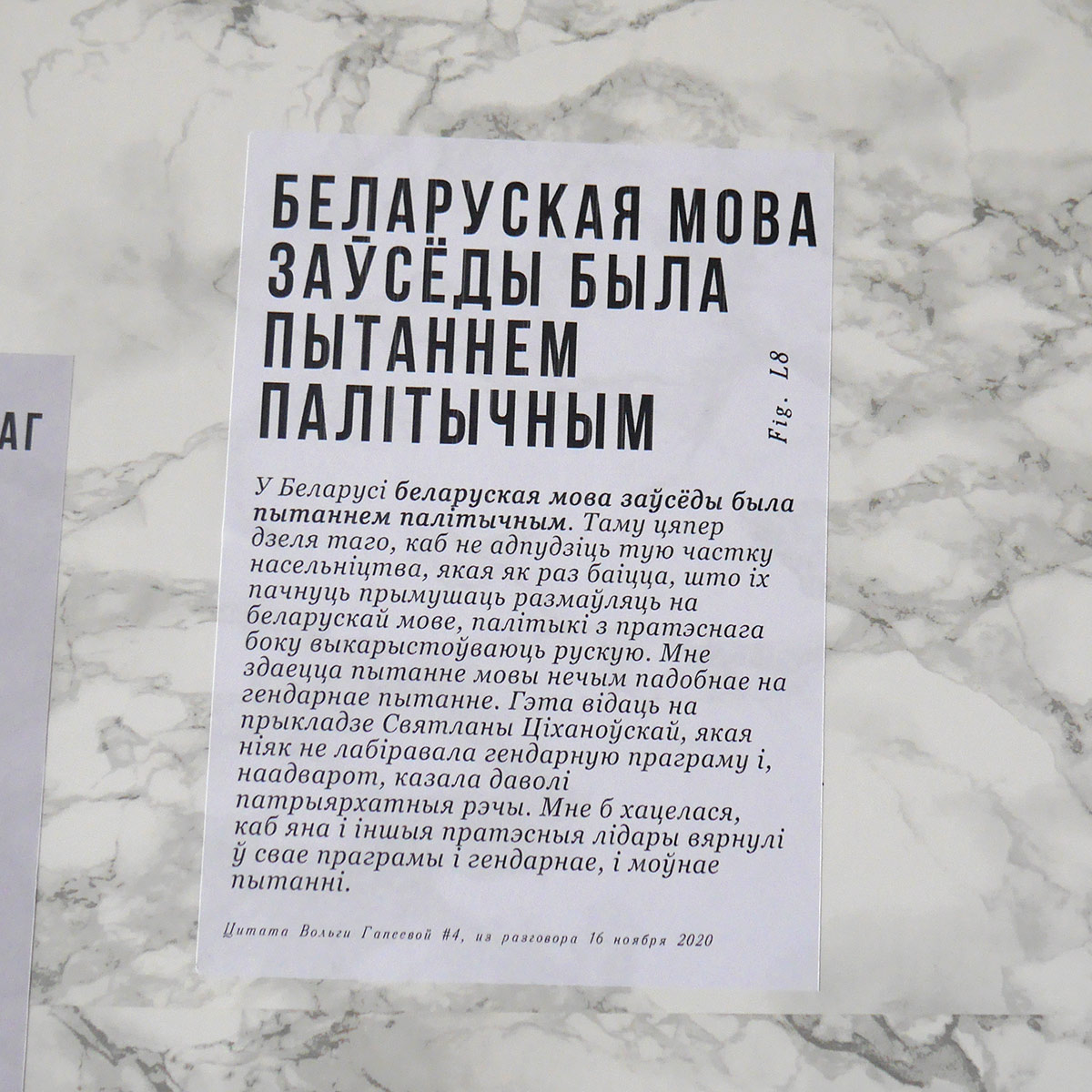
Quote by Volha Hapeyeva #4
In Belarus, the Belarusian language has always been a political issue. Therefore, now, in order not to alienate the portion of the population that is afraid they will be forced to speak Belarusian, politicians from the protest side use Russian. It seems to me that the language issue is somewhat similar to the gender issue. This can be seen in the example of Sviatlana Tsikhanouskaya, who did not advocate for a gender program and, on the contrary, expressed rather patriarchal views. I would like her and other protest leaders to include both gender and language issues in their programs.
From a conversation on November 16, 2020
The Belarusian language has always been a political issue
In Belarus, the Belarusian language has always been a political issue. Therefore, now, in order not to alienate the portion of the population that is afraid they will be forced to speak Belarusian, politicians from the protest side use Russian. It seems to me that the language issue is somewhat similar to the gender issue. This can be seen in the example of Sviatlana Tsikhanouskaya, who did not advocate for a gender program and, on the contrary, expressed rather patriarchal views. I would like her and other protest leaders to include both gender and language issues in their programs.
From a conversation on November 16, 2020
Цитата Воли Гапеевой #4
У Беларусі беларуская мова заўсёды была пытаннем палітычным. Таму цяпер дзеля таго, каб не адпудзіць тую частку насельніцтва, якая як раз баіцца, што іх пачнуць прымушаць размаўляць на беларускай мове, палітыкі з пратэснага боку выкарыстоўваюць рускую. Мне здаецца пытанне мовы нечым падобнае на гендарнае пытанне. Гэта відаць на прыкладзе Святланы Ціханоўскай, якая ніяк не лабіравала гендарную праграму і, наадварот, казала даволі патрыярхатныя рэчы. Мне б хацелася, каб яна і іншыя пратэсныя лідары вярнулі ў свае праграмы і гендарнае, і моўнае пытанні.
Из разговора 16 ноября 2020 года
Беларуская мова заўсёды была пытаннем палітычным
У Беларусі беларуская мова заўсёды была пытаннем палітычным. Таму цяпер дзеля таго, каб не адпудзіць тую частку насельніцтва, якая як раз баіцца, што іх пачнуць прымушаць размаўляць на беларускай мове, палітыкі з пратэснага боку выкарыстоўваюць рускую. Мне здаецца пытанне мовы нечым падобнае на гендарнае пытанне. Гэта відаць на прыкладзе Святланы Ціханоўскай, якая ніяк не лабіравала гендарную праграму і, наадварот, казала даволі патрыярхатныя рэчы. Мне б хацелася, каб яна і іншыя пратэсныя лідары вярнулі ў свае праграмы і гендарнае, і моўнае пытанні.
Из разговора 16 ноября 2020 года
Fig. M8
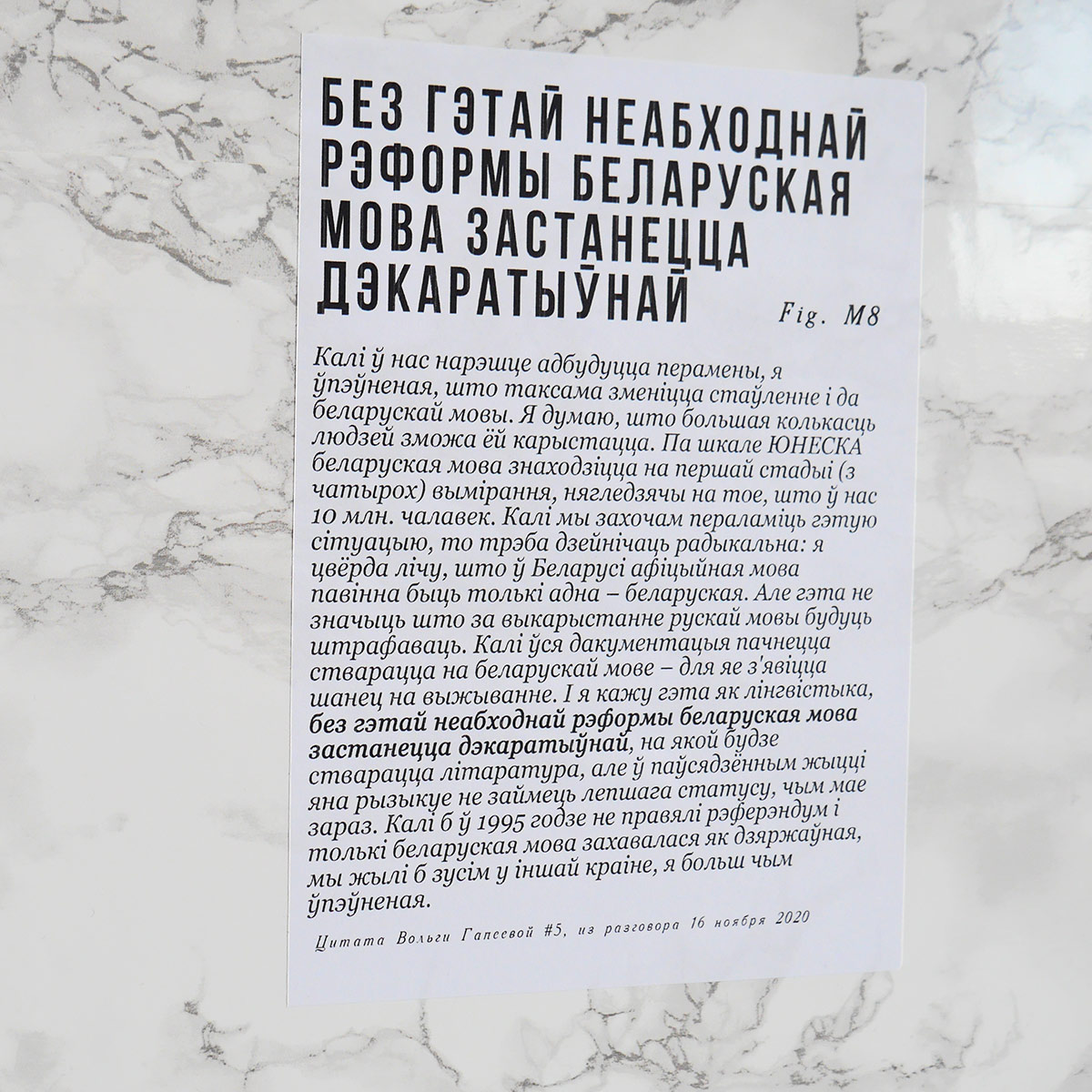
Quote by Volha Hapeyeva #5
When changes finally occur in our country, I am confident that attitudes towards the Belarusian language will also change. I believe that more people will be able to use it. According to UNESCO's scale, the Belarusian language is at the first stage (out of four) of extinction, despite the fact that we have 10 million people. If we want to overcome this situation, we need to take radical action: I firmly believe that in Belarus there should be only one official language – Belarusian. But that doesn't mean that using the Russian language will be punished. If all documentation starts to be created in Belarusian, it will have a chance to survive. And I say this as a linguist, without this necessary reform, the Belarusian language will remain decorative, literature will be created in it, but in everyday life, it risks not taking on a better status than it currently has. If in 1995 there had not been a referendum and only the Belarusian language had been preserved as the state language, we would have lived in a completely different country, I am more than sure of that.
From a conversation on November 16, 2020
Without this necessary reform, the Belarusian language will remain decorative
When changes finally occur in our country, I am confident that attitudes towards the Belarusian language will also change. I believe that more people will be able to use it. According to UNESCO's scale, the Belarusian language is at the first stage (out of four) of extinction, despite the fact that we have 10 million people. If we want to overcome this situation, we need to take radical action: I firmly believe that in Belarus there should be only one official language – Belarusian. But that doesn't mean that using the Russian language will be punished. If all documentation starts to be created in Belarusian, it will have a chance to survive. And I say this as a linguist, without this necessary reform, the Belarusian language will remain decorative, literature will be created in it, but in everyday life, it risks not taking on a better status than it currently has. If in 1995 there had not been a referendum and only the Belarusian language had been preserved as the state language, we would have lived in a completely different country, I am more than sure of that.
From a conversation on November 16, 2020
Цитата Воли Гапеевой #5
Калі ў нас нарэшце адбудуцца перамены, я ўпэўненая, што таксама зменіцца стаўленне і да беларускай мовы. Я думаю, што большая колькасць людзей зможа ёй карыстацца. Па шкале ЮНЕСКА беларуская мова знаходзіцца на першай стадыі (з чатырох) вымірання, нягледзячы на тое, што ў нас 10 млн. чалавек. Калі мы захочам пераламіць гэтую сітуацыю, то трэба дзейнічаць радыкальна: я цвёрда лічу, што ў Беларусі афіцыйная мова павінна быць толькі адна – беларуская. Але гэта не значыць што за выкарыстанне рускай мовы будуць штрафаваць. Калі ўся дакументацыя пачнецца стварацца на беларускай мове – для яе з'явіцца шанец на выжыванне. І я кажу гэта як лінгвістыка, без гэтай неабходнай рэформы беларуская мова застанецца дэкаратыўнай, на якой будзе стварацца літаратура, але ў паўсядзённым жыцці яна рызыкуе не займець лепшага статусу, чым мае зараз. Калі б ў 1995 годзе не правялі рэферэндум і толькі беларуская мова захавалася як дзяржаўная, мы жылі б зусім у іншай краіне, я больш чым ўпэўненая.
Из разговора 16 ноября 2020 года
Без гэтай неабходнай рэформы беларуская мова застанецца дэкаратыўнай
Калі ў нас нарэшце адбудуцца перамены, я ўпэўненая, што таксама зменіцца стаўленне і да беларускай мовы. Я думаю, што большая колькасць людзей зможа ёй карыстацца. Па шкале ЮНЕСКА беларуская мова знаходзіцца на першай стадыі (з чатырох) вымірання, нягледзячы на тое, што ў нас 10 млн. чалавек. Калі мы захочам пераламіць гэтую сітуацыю, то трэба дзейнічаць радыкальна: я цвёрда лічу, што ў Беларусі афіцыйная мова павінна быць толькі адна – беларуская. Але гэта не значыць што за выкарыстанне рускай мовы будуць штрафаваць. Калі ўся дакументацыя пачнецца стварацца на беларускай мове – для яе з'явіцца шанец на выжыванне. І я кажу гэта як лінгвістыка, без гэтай неабходнай рэформы беларуская мова застанецца дэкаратыўнай, на якой будзе стварацца літаратура, але ў паўсядзённым жыцці яна рызыкуе не займець лепшага статусу, чым мае зараз. Калі б ў 1995 годзе не правялі рэферэндум і толькі беларуская мова захавалася як дзяржаўная, мы жылі б зусім у іншай краіне, я больш чым ўпэўненая.
Из разговора 16 ноября 2020 года
Fig. N8

Quote by Volha Hapeyeva #6
The type of governance under Lukashenko is hegemonic masculinity, where women have no place at all. People have grown tired of this image of the stern "father," so the images of Tsikhanouskaya, Kalesnikava, and Tsepkalo resonated as an alternative image of "mother." In the German press, they compared the Belarusian and American situations, where Trump's patriarchal governance closely resembles Lukashenko's regime in its masculine hegemony. They wrote that democracy is softer than authoritarian politics and to some extent can be more similar to "feminine" governance. Although the concepts of "feminine" and "masculine" are mentioned here more as stereotypes.
From a conversation on November 16, 2020
Hegemonic masculinity
The type of governance under Lukashenko is hegemonic masculinity, where women have no place at all. People have grown tired of this image of the stern "father," so the images of Tsikhanouskaya, Kalesnikava, and Tsepkalo resonated as an alternative image of "mother." In the German press, they compared the Belarusian and American situations, where Trump's patriarchal governance closely resembles Lukashenko's regime in its masculine hegemony. They wrote that democracy is softer than authoritarian politics and to some extent can be more similar to "feminine" governance. Although the concepts of "feminine" and "masculine" are mentioned here more as stereotypes.
From a conversation on November 16, 2020
Цитата Воли Гапеевой #6
Тып кіравання пры Лукашэнку гэта гегемонная маскуліннасць, дзе жанчыне наогул няма месца. Людзі стаміліся ад гэтага вобразу суворага "бацькі", а таму вобразы Ціханоўскай, Калеснікавай і Цэпкала знайшлі водгук у выглядзе альтэрнатыўнага вобразу "маці". У нямецкай прэсе параўноўвалі беларускую і амерыканскую сітуацыю, пры якіх патрыярхатнае кіраванне Трампа вельмі падобна на рэжым Лукашэнкі па сваёй гэтай маскуліннай гегемоніі. Там пісалі, што дэмакратыя больш мяккая, чым аўтарытарная палітыка, і ў нейкай ступені можа быць больш падобнай да “”жаночага” тыпу кіравання. Хаця паняцці “жаночы” і “мужчынскі” фігуруюць тут хутчэй як стэрэатыпы.
Из разговора 16 ноября 2020 года
Гегемонная маскуліннасць
Тып кіравання пры Лукашэнку гэта гегемонная маскуліннасць, дзе жанчыне наогул няма месца. Людзі стаміліся ад гэтага вобразу суворага "бацькі", а таму вобразы Ціханоўскай, Калеснікавай і Цэпкала знайшлі водгук у выглядзе альтэрнатыўнага вобразу "маці". У нямецкай прэсе параўноўвалі беларускую і амерыканскую сітуацыю, пры якіх патрыярхатнае кіраванне Трампа вельмі падобна на рэжым Лукашэнкі па сваёй гэтай маскуліннай гегемоніі. Там пісалі, што дэмакратыя больш мяккая, чым аўтарытарная палітыка, і ў нейкай ступені можа быць больш падобнай да “”жаночага” тыпу кіравання. Хаця паняцці “жаночы” і “мужчынскі” фігуруюць тут хутчэй як стэрэатыпы.
Из разговора 16 ноября 2020 года
Fig. O8
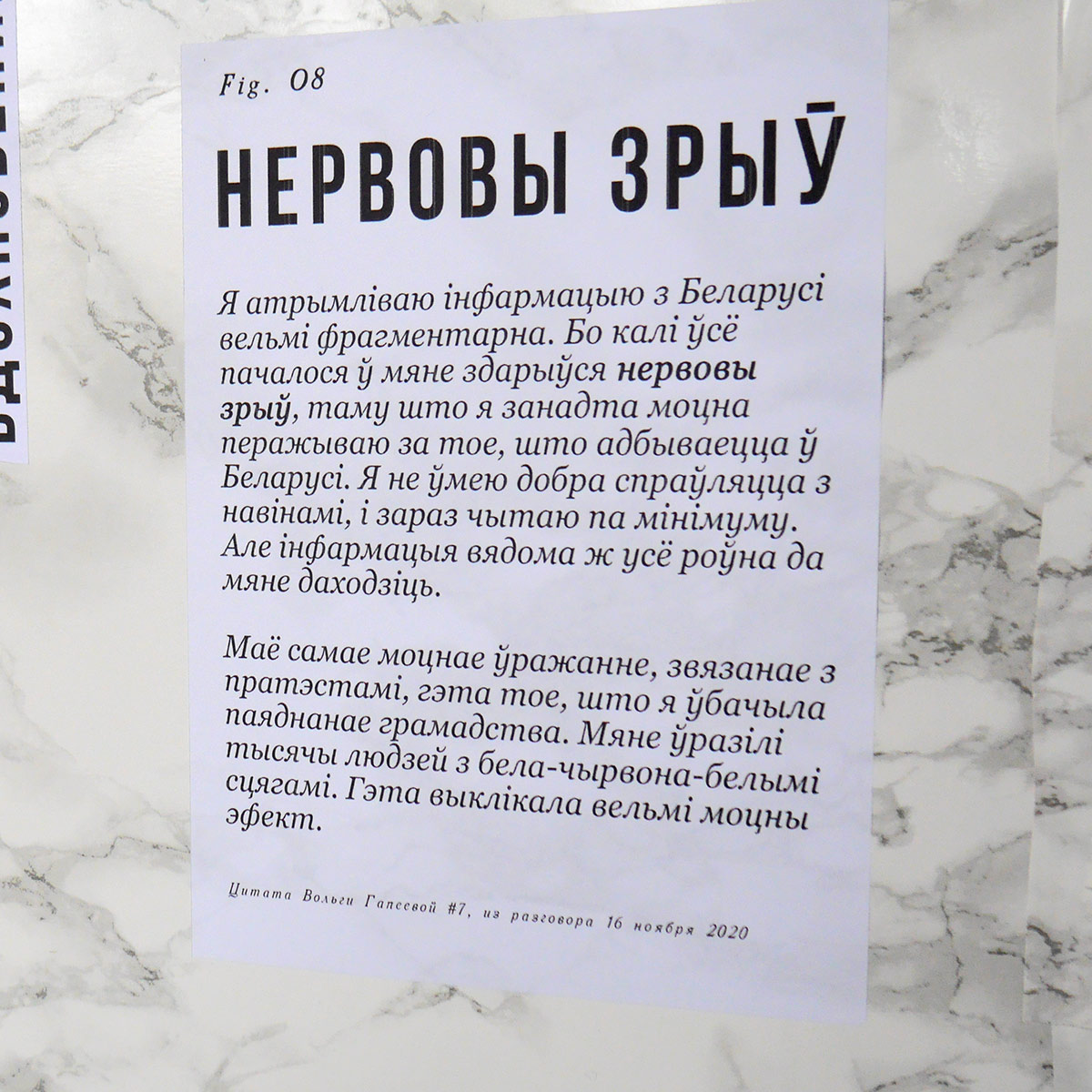
Quote by Volha Hapeyeva #7
I receive information from Belarus very fragmentarily. When everything started, I had a nervous breakdown because I feel too strongly about what is happening in Belarus. I'm not good at handling news well, so I'm reading minimally now. But information still reaches me.
My strongest impression associated with the protests is that I saw a united society. I was impressed by thousands of people with white-red-white flags. It had a very powerful effect on me.
From a conversation on November 16, 2020
Nervous breakdown
I receive information from Belarus very fragmentarily. When everything started, I had a nervous breakdown because I feel too strongly about what is happening in Belarus. I'm not good at handling news well, so I'm reading minimally now. But information still reaches me.
My strongest impression associated with the protests is that I saw a united society. I was impressed by thousands of people with white-red-white flags. It had a very powerful effect on me.
From a conversation on November 16, 2020
Цитата Воли Гапеевой #7
Я атрымліваю інфармацыю з Беларусі вельмі фрагментарна. Бо калі ўсё пачалося ў мяне здарыўся нервовы зрыў, таму што я занадта моцна перажываю за тое, што адбываецца ў Беларусі. Я не ўмею добра спраўляцца з навінамі, і зараз чытаю па мінімуму. Але інфармацыя вядома ж усё роўна да мяне даходзіць.
Маё самае моцнае ўражанне, звязанае з пратэстамі, гэта тое, што я ўбачыла паяднанае грамадства. Мяне ўразілі тысячы людзей з бела-чырвона-белымі сцягамі. Гэта выклікала вельмі моцны эфект.
Из разговора 16 ноября 2020 года
Нервовы зрыў
Я атрымліваю інфармацыю з Беларусі вельмі фрагментарна. Бо калі ўсё пачалося ў мяне здарыўся нервовы зрыў, таму што я занадта моцна перажываю за тое, што адбываецца ў Беларусі. Я не ўмею добра спраўляцца з навінамі, і зараз чытаю па мінімуму. Але інфармацыя вядома ж усё роўна да мяне даходзіць.
Маё самае моцнае ўражанне, звязанае з пратэстамі, гэта тое, што я ўбачыла паяднанае грамадства. Мяне ўразілі тысячы людзей з бела-чырвона-белымі сцягамі. Гэта выклікала вельмі моцны эфект.
Из разговора 16 ноября 2020 года
Fig. P8
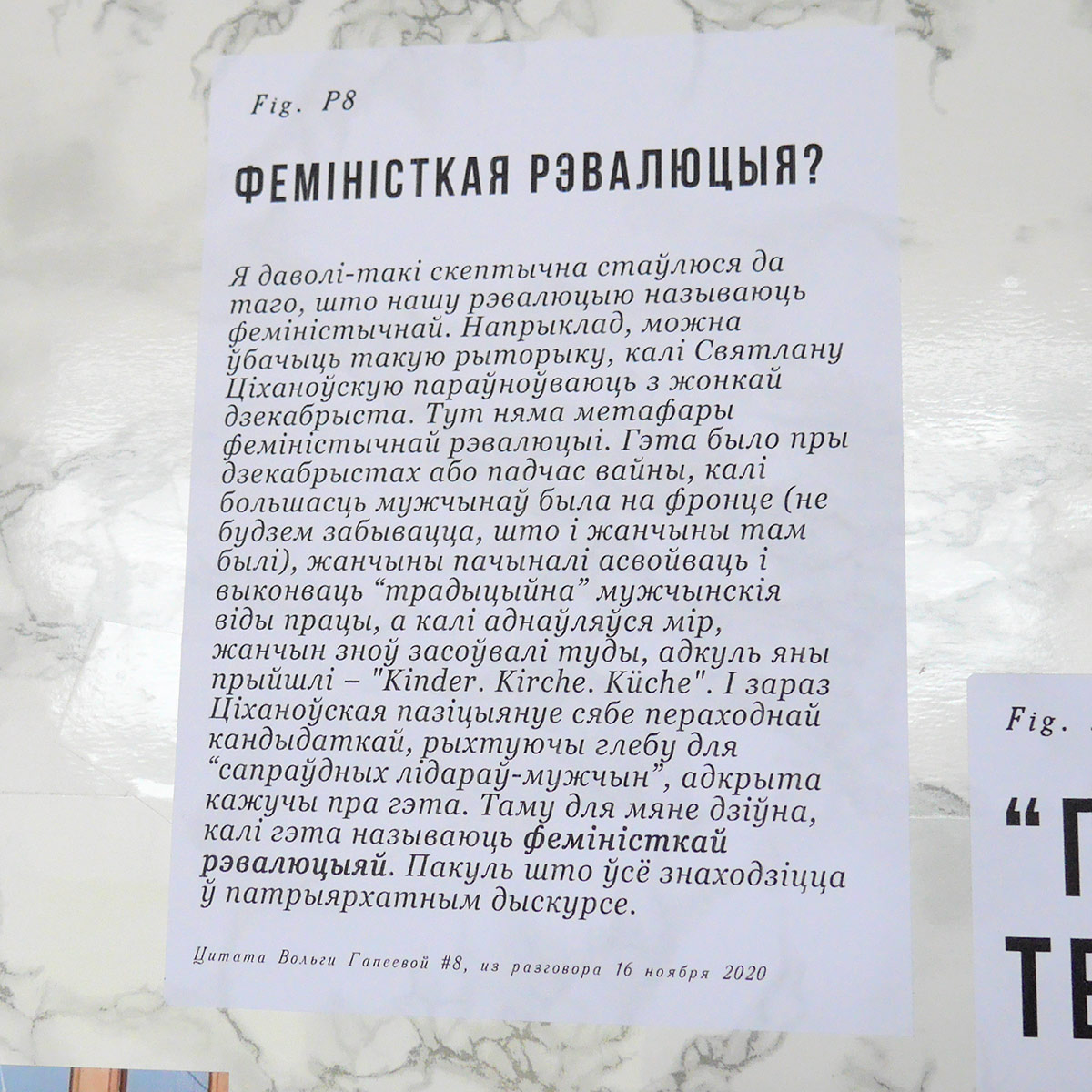
Quote by Volha Hapeyeva #8
I am quite skeptical about calling our revolution feminist. For example, you can see such rhetoric when Sviatlana Tsikhanouskaya is compared to the wife of a Decembrist. There is no metaphor of a feminist revolution here. It was during the Decembrists or during the war, when most men were at the front (let's not forget that there were women there too), women began to adopt and perform "traditionally" male types of work, and when peace was restored, women returned to where they came from - "Kinder, Kirche, Küche" ("Children, Church, Kitchen"). And now Tsikhanouskaya positions herself as a transitional candidate, preparing the ground for "real male leaders," openly talking about it. Therefore, it seems strange to me when this is called a feminist revolution. For now, everything is still in a patriarchal discourse.
From a conversation on November 16, 2020
Feminist revolution?
I am quite skeptical about calling our revolution feminist. For example, you can see such rhetoric when Sviatlana Tsikhanouskaya is compared to the wife of a Decembrist. There is no metaphor of a feminist revolution here. It was during the Decembrists or during the war, when most men were at the front (let's not forget that there were women there too), women began to adopt and perform "traditionally" male types of work, and when peace was restored, women returned to where they came from - "Kinder, Kirche, Küche" ("Children, Church, Kitchen"). And now Tsikhanouskaya positions herself as a transitional candidate, preparing the ground for "real male leaders," openly talking about it. Therefore, it seems strange to me when this is called a feminist revolution. For now, everything is still in a patriarchal discourse.
From a conversation on November 16, 2020
Цитата Воли Гапеевой #8
Я даволі-такі скептычна стаўлюся да таго, што нашу рэвалюцыю называюць феміністычнай. Напрыклад, можна ўбачыць такую рыторыку, калі Святлану Ціханоўскую параўноўваюць з жонкай дзекабрыста. Тут няма метафары феміністычнай рэвалюцыі. Гэта было пры дзекабрыстах або падчас вайны, калі большасць мужчынаў была на фронце (не будзем забывацца, што і жанчыны там былі), жанчыны пачыналі асвойваць і выконваць “традыцыйна” мужчынскія віды працы, а калі аднаўляўся мір, жанчын зноў засоўвалі туды, адкуль яны прыйшлі – "Kinder. Kirche. Küche". І зараз Ціханоўская пазіцыянуе сябе пераходнай кандыдаткай, рыхтуючы глебу для “сапраўдных лідараў-мужчын”, адкрыта кажучы пра гэта. Таму для мяне дзіўна, калі гэта называюць феміністкай рэвалюцыяй. Пакуль што ўсё знаходзіцца ў патрыярхатным дыскурсе.
Из разговора 16 ноября 2020 года
Феміністкая рэвалюцыя?
Я даволі-такі скептычна стаўлюся да таго, што нашу рэвалюцыю называюць феміністычнай. Напрыклад, можна ўбачыць такую рыторыку, калі Святлану Ціханоўскую параўноўваюць з жонкай дзекабрыста. Тут няма метафары феміністычнай рэвалюцыі. Гэта было пры дзекабрыстах або падчас вайны, калі большасць мужчынаў была на фронце (не будзем забывацца, што і жанчыны там былі), жанчыны пачыналі асвойваць і выконваць “традыцыйна” мужчынскія віды працы, а калі аднаўляўся мір, жанчын зноў засоўвалі туды, адкуль яны прыйшлі – "Kinder. Kirche. Küche". І зараз Ціханоўская пазіцыянуе сябе пераходнай кандыдаткай, рыхтуючы глебу для “сапраўдных лідараў-мужчын”, адкрыта кажучы пра гэта. Таму для мяне дзіўна, калі гэта называюць феміністкай рэвалюцыяй. Пакуль што ўсё знаходзіцца ў патрыярхатным дыскурсе.
Из разговора 16 ноября 2020 года
Fig. Q8
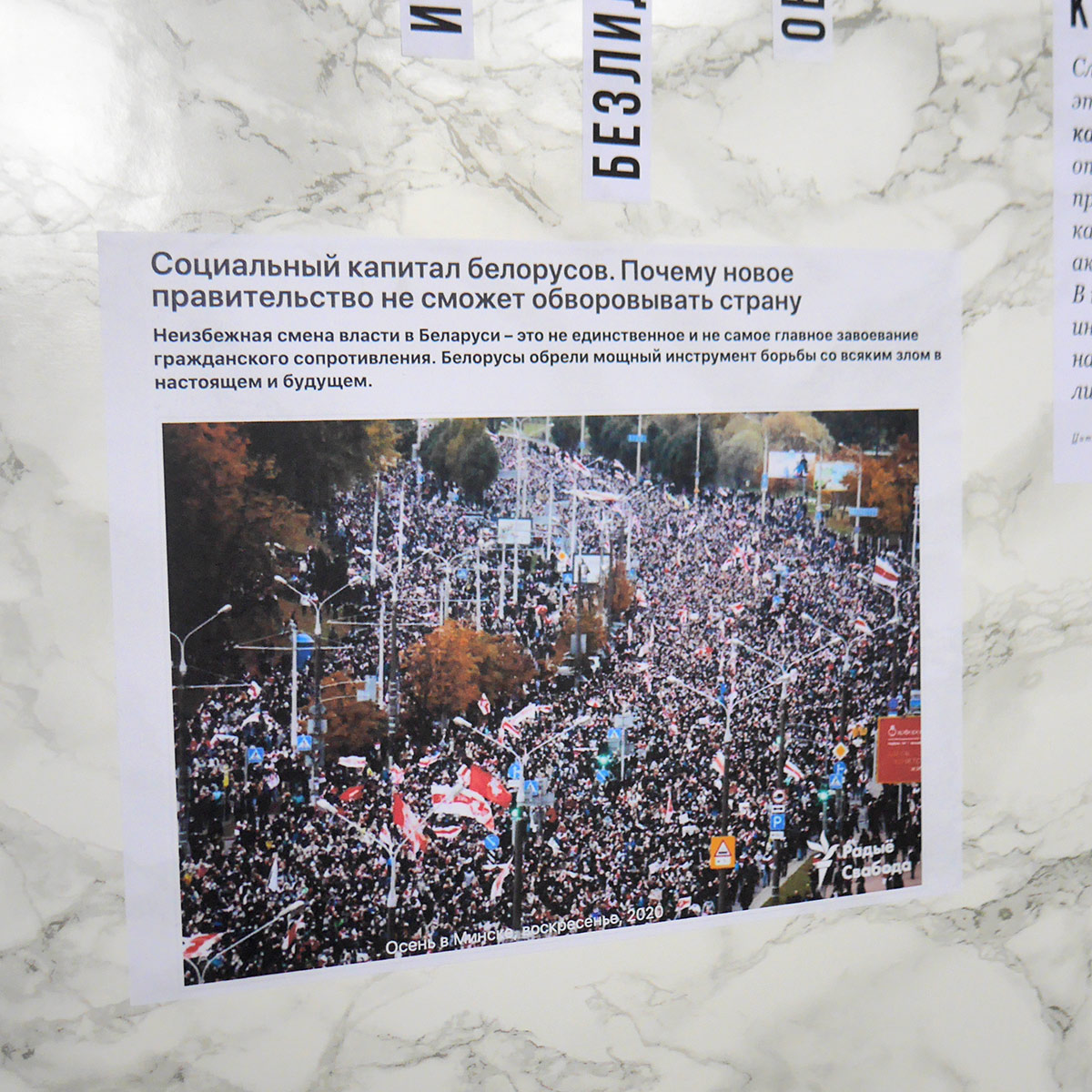
Social capital of Belarusians. Why the new government won't be able to steal the country
Anastasia Gurina
belaruspartisan.by
Социальный капитал белорусов. Почему новое правительство не сможет обворовывать страну
Анастасия Гурина
belaruspartisan.by
Fig. R8

More than 140 writers have asked Lukashenko to admit defeat after one hundred days of protests
Liliya Karaeva / November 18, 2020
rusplt.ru
Более 140 писателей попросили Лукашенко признать поражение после ста дней протестов
Лилия Караева / 18 ноября 2020 года
rusplt.ru
Fig. S8
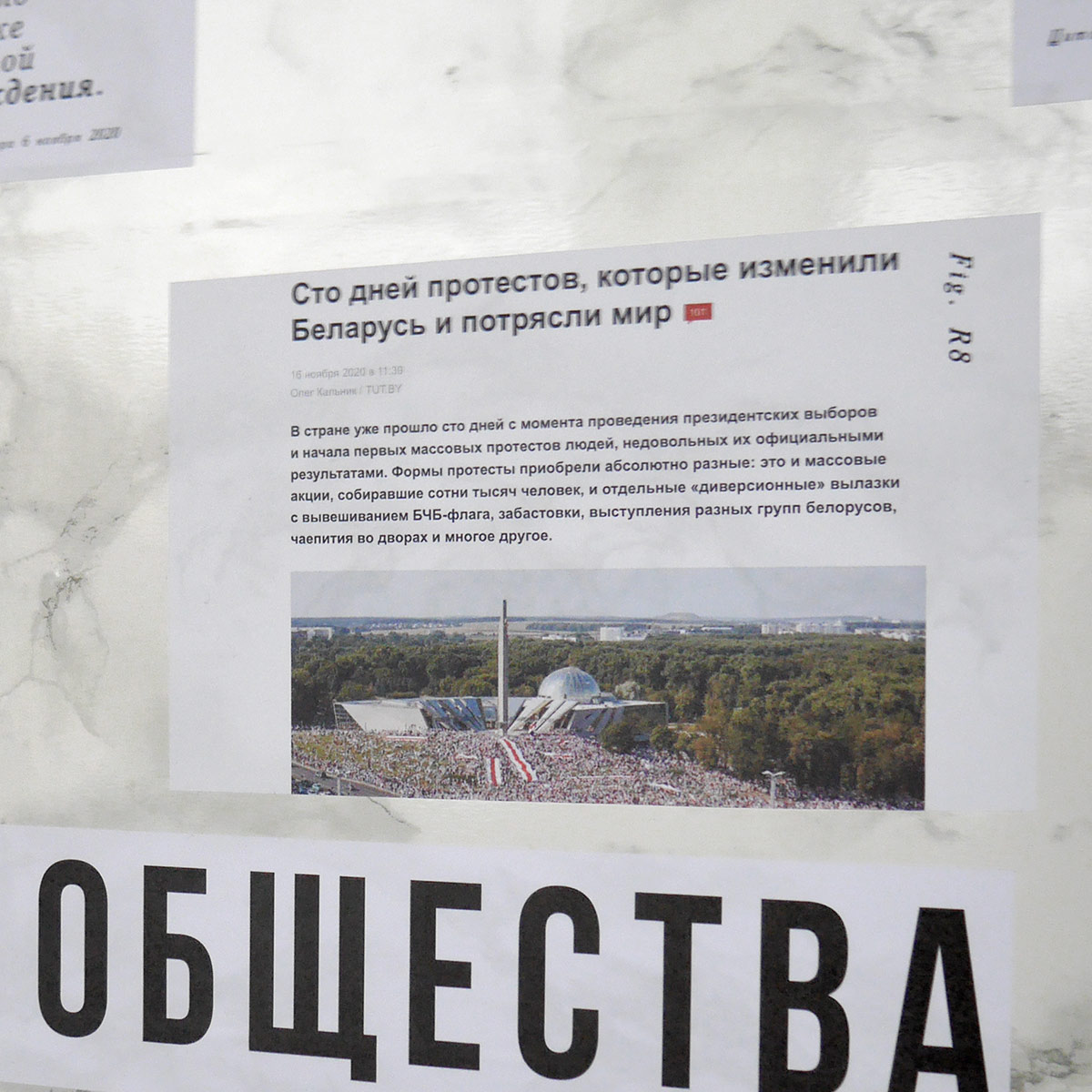
One hundred days of protests that changed Belarus and shook the world
Oleg Kalnik / November 16, 2020
news.tut.by
Сто дней протестов, которые изменили Беларусь и потрясли мир
Олег Кальник / 16 ноября 2020 года
news.tut.by
Fig. T8
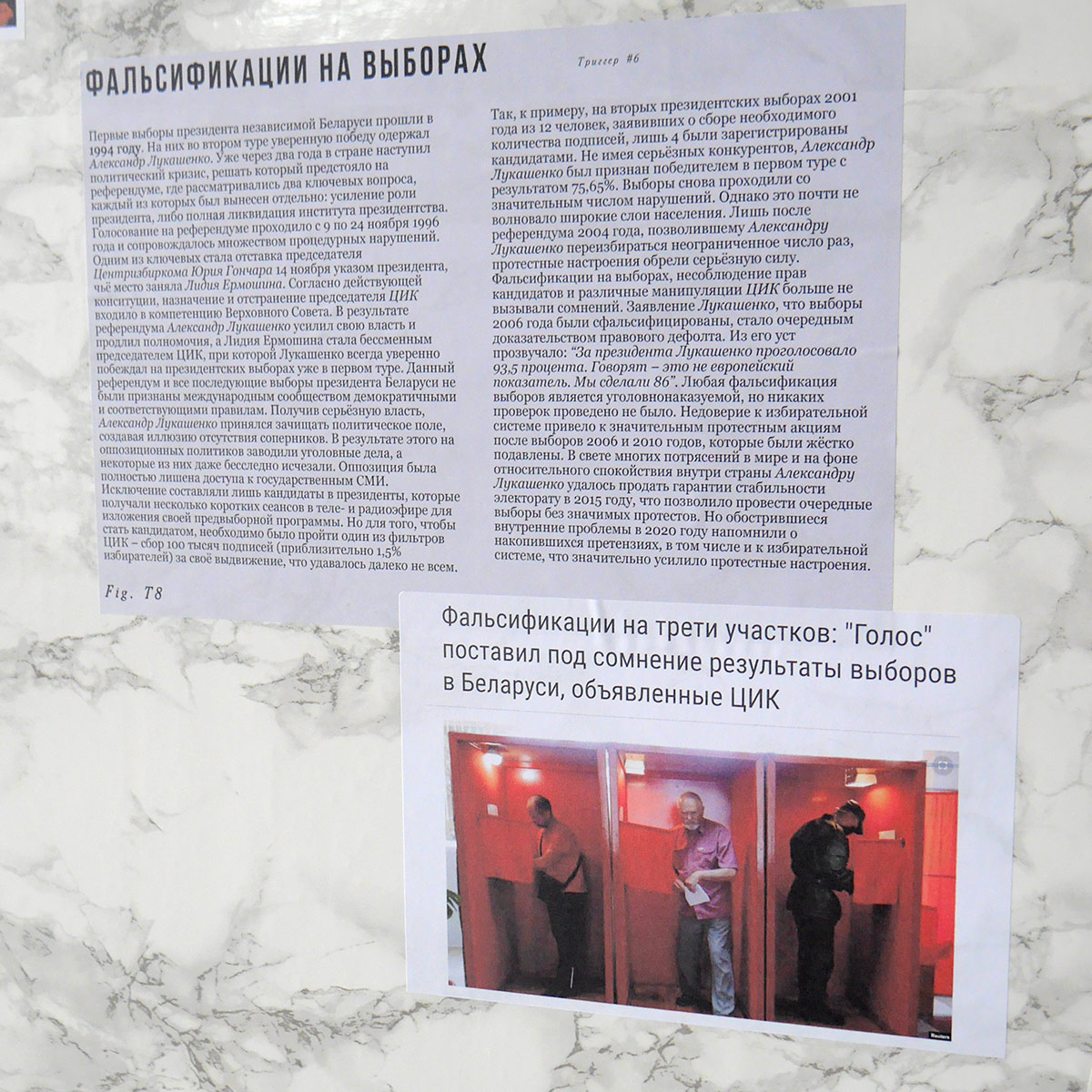
Trigger #6
The first presidential elections in independent Belarus took place in 1994. In the second round, Alexander Lukashenko secured a convincing victory. Just two years later, the country faced a political crisis, which was to be resolved through a referendum. The referendum addressed two key issues: enhancing the role of the president or completely abolishing the presidency. The voting took place from November 9 to November 24, 1996, accompanied by numerous procedural violations. One of the key events was the dismissal of the Chairman of the Central Election Commission, Yuri Gonchar, by the president's decree on November 14. His position was taken by Lidia Yermoshina. According to the constitution at the time, the appointment and dismissal of the CEC chairman fell within the competence of the Supreme Council. As a result of the referendum, Alexander Lukashenko strengthened his power and extended his term, and Lidia Yermoshina became the permanent chairperson of the CEC, under whom Lukashenko consistently won presidential elections in the first round. Neither this referendum nor subsequent presidential elections in Belarus were recognized by the international community as democratic and compliant with standards. Having obtained significant power, Alexander Lukashenko began to clear the political field, creating an illusion of the absence of opponents. As a result, criminal cases were initiated against opposition politicians, and some of them even disappeared without a trace. The opposition was completely deprived of access to state media. The exception was presidential candidates, who received several short sessions on television and radio to present their pre-election programs. However, to become a candidate, one had to pass one of the CEC filters – collecting 100,000 signatures (approximately 1.5% of voters) to nominate themselves, which was not successful for everyone. For example, in the second presidential elections in 2001, out of 12 people who announced the collection of the required number of signatures, only 4 were registered as candidates. Without serious competitors, Alexander Lukashenko was declared the winner in the first round with 75.65% of the vote. The elections again took place with significant violations. However, this almost did not concern the wider population. Only after the 2004 referendum, which allowed Alexander Lukashenko to be re-elected an unlimited number of times, did the protest sentiments gain serious strength. Electoral fraud, violations of candidates' rights, and various manipulations by the CEC were no longer in doubt. Lukashenko's statement that the 2006 elections were rigged became another proof of the legal default. From his mouth came: "93.5 percent voted for President Lukashenko. They say – this is not a European indicator. We did 86." Any falsification of elections is punishable by law, but no investigations were conducted. Distrust in the electoral system led to significant protests after the elections in 2006 and 2010, which were harshly suppressed. Against the backdrop of many upheavals in the world and relative calm within the country, Alexander Lukashenko managed to sell electoral stability guarantees to the electorate in 2015, allowing the next elections to be held without significant protests. However, the exacerbated internal problems in 2020 reminded of accumulated grievances, including those related to the electoral system, significantly intensifying protest sentiments.
Election Fraud
The first presidential elections in independent Belarus took place in 1994. In the second round, Alexander Lukashenko secured a convincing victory. Just two years later, the country faced a political crisis, which was to be resolved through a referendum. The referendum addressed two key issues: enhancing the role of the president or completely abolishing the presidency. The voting took place from November 9 to November 24, 1996, accompanied by numerous procedural violations. One of the key events was the dismissal of the Chairman of the Central Election Commission, Yuri Gonchar, by the president's decree on November 14. His position was taken by Lidia Yermoshina. According to the constitution at the time, the appointment and dismissal of the CEC chairman fell within the competence of the Supreme Council. As a result of the referendum, Alexander Lukashenko strengthened his power and extended his term, and Lidia Yermoshina became the permanent chairperson of the CEC, under whom Lukashenko consistently won presidential elections in the first round. Neither this referendum nor subsequent presidential elections in Belarus were recognized by the international community as democratic and compliant with standards. Having obtained significant power, Alexander Lukashenko began to clear the political field, creating an illusion of the absence of opponents. As a result, criminal cases were initiated against opposition politicians, and some of them even disappeared without a trace. The opposition was completely deprived of access to state media. The exception was presidential candidates, who received several short sessions on television and radio to present their pre-election programs. However, to become a candidate, one had to pass one of the CEC filters – collecting 100,000 signatures (approximately 1.5% of voters) to nominate themselves, which was not successful for everyone. For example, in the second presidential elections in 2001, out of 12 people who announced the collection of the required number of signatures, only 4 were registered as candidates. Without serious competitors, Alexander Lukashenko was declared the winner in the first round with 75.65% of the vote. The elections again took place with significant violations. However, this almost did not concern the wider population. Only after the 2004 referendum, which allowed Alexander Lukashenko to be re-elected an unlimited number of times, did the protest sentiments gain serious strength. Electoral fraud, violations of candidates' rights, and various manipulations by the CEC were no longer in doubt. Lukashenko's statement that the 2006 elections were rigged became another proof of the legal default. From his mouth came: "93.5 percent voted for President Lukashenko. They say – this is not a European indicator. We did 86." Any falsification of elections is punishable by law, but no investigations were conducted. Distrust in the electoral system led to significant protests after the elections in 2006 and 2010, which were harshly suppressed. Against the backdrop of many upheavals in the world and relative calm within the country, Alexander Lukashenko managed to sell electoral stability guarantees to the electorate in 2015, allowing the next elections to be held without significant protests. However, the exacerbated internal problems in 2020 reminded of accumulated grievances, including those related to the electoral system, significantly intensifying protest sentiments.
Триггер #6
Первые выборы президента независимой Беларуси прошли в 1994 году. На них во втором туре уверенную победу одержал Александр Лукашенко. Уже через два года в стране наступил политический кризис, решать который предстояло на референдуме, где рассматривались два ключевых вопроса, каждый из которых был вынесен отдельно: усиление роли президента, либо полная ликвидация института президентства. Голосование на референдуме проходило с 9 по 24 ноября 1996 года и сопровождалось множеством процедурных нарушений. Одним из ключевых стала отставка председателя Центризбиркома Юрия Гончара 14 ноября указом президента, чьё место заняла Лидия Ермошина. Согласно действующей конситуции, назначение и отстранение председателя ЦИК входило в компетенцию Верховного Совета. В результате референдума Александр Лукашенко усилил свою власть и продлил полномочия, а Лидия Ермошина стала бессменным председателем ЦИК, при которой Лукашенко всегда уверенно побеждал на президентских выборах уже в первом туре. Данный референдум и все последующие выборы президента Беларуси не были признаны международным сообществом демократичными и соответствующими правилам. Получив серьёзную власть, Александр Лукашенко принялся зачищать политическое поле, создавая иллюзию отсутствия соперников. В результате этого на оппозиционных политиков заводили уголовные дела, а некоторые из них даже бесследно исчезали. Оппозиция была полностью лишена доступа к государственным СМИ. Исключение составляли лишь кандидаты в президенты, которые получали несколько коротких сеансов в теле- и радиоэфире для изложения своей предвыборной программы. Но для того, чтобы стать кандидатом, необходимо было пройти один из фильтров ЦИК – сбор 100 тысяч подписей (приблизительно 1,5% избирателей) за своё выдвижение, что удавалось далеко не всем. Так, к примеру, на вторых президентских выборах 2001 года из 12 человек, заявивших о сборе необходимого количества подписей, лишь 4 были зарегистрированы кандидатами. Не имея серьёзных конкурентов, Александр Лукашенко был признан победителем в первом туре с результатом 75,65%. Выборы снова проходили со значительным числом нарушений. Однако это почти не волновало широкие слои населения. Лишь после референдума 2004 года, позволившему Александру Лукашенко переизбираться неограниченное число раз, протестные настроения обрели серьёзную силу. Фальсификации на выборах, несоблюдение прав кандидатов и различные манипуляции ЦИК больше не вызывали сомнений. Заявление Лукашенко, что выборы 2006 года были сфальсифицированы, стало очередным доказательством правового дефолта. Из его уст прозвучало: “За президента Лукашенко проголосовало 93,5 процента. Говорят – это не европейский показатель. Мы сделали 86”. Любая фальсификация выборов является уголовнонаказуемой, но никаких проверок проведено не было. Недоверие к избирательной системе привело к значительным протестным акциям после выборов 2006 и 2010 годов, которые были жёстко подавлены. В свете многих потрясений в мире и на фоне относительного спокойствия внутри страны Александру Лукашенко удалось продать гарантии стабильности электорату в 2015 году, что позволило провести очередные выборы без значимых протестов. Но обострившиеся внутренние проблемы в 2020 году напомнили о накопившихся претензиях, в том числе и к избирательной системе, что значительно усилило протестные настроения.
Скриншот: currenttime.tv
Фальсификации на выборах
Первые выборы президента независимой Беларуси прошли в 1994 году. На них во втором туре уверенную победу одержал Александр Лукашенко. Уже через два года в стране наступил политический кризис, решать который предстояло на референдуме, где рассматривались два ключевых вопроса, каждый из которых был вынесен отдельно: усиление роли президента, либо полная ликвидация института президентства. Голосование на референдуме проходило с 9 по 24 ноября 1996 года и сопровождалось множеством процедурных нарушений. Одним из ключевых стала отставка председателя Центризбиркома Юрия Гончара 14 ноября указом президента, чьё место заняла Лидия Ермошина. Согласно действующей конситуции, назначение и отстранение председателя ЦИК входило в компетенцию Верховного Совета. В результате референдума Александр Лукашенко усилил свою власть и продлил полномочия, а Лидия Ермошина стала бессменным председателем ЦИК, при которой Лукашенко всегда уверенно побеждал на президентских выборах уже в первом туре. Данный референдум и все последующие выборы президента Беларуси не были признаны международным сообществом демократичными и соответствующими правилам. Получив серьёзную власть, Александр Лукашенко принялся зачищать политическое поле, создавая иллюзию отсутствия соперников. В результате этого на оппозиционных политиков заводили уголовные дела, а некоторые из них даже бесследно исчезали. Оппозиция была полностью лишена доступа к государственным СМИ. Исключение составляли лишь кандидаты в президенты, которые получали несколько коротких сеансов в теле- и радиоэфире для изложения своей предвыборной программы. Но для того, чтобы стать кандидатом, необходимо было пройти один из фильтров ЦИК – сбор 100 тысяч подписей (приблизительно 1,5% избирателей) за своё выдвижение, что удавалось далеко не всем. Так, к примеру, на вторых президентских выборах 2001 года из 12 человек, заявивших о сборе необходимого количества подписей, лишь 4 были зарегистрированы кандидатами. Не имея серьёзных конкурентов, Александр Лукашенко был признан победителем в первом туре с результатом 75,65%. Выборы снова проходили со значительным числом нарушений. Однако это почти не волновало широкие слои населения. Лишь после референдума 2004 года, позволившему Александру Лукашенко переизбираться неограниченное число раз, протестные настроения обрели серьёзную силу. Фальсификации на выборах, несоблюдение прав кандидатов и различные манипуляции ЦИК больше не вызывали сомнений. Заявление Лукашенко, что выборы 2006 года были сфальсифицированы, стало очередным доказательством правового дефолта. Из его уст прозвучало: “За президента Лукашенко проголосовало 93,5 процента. Говорят – это не европейский показатель. Мы сделали 86”. Любая фальсификация выборов является уголовнонаказуемой, но никаких проверок проведено не было. Недоверие к избирательной системе привело к значительным протестным акциям после выборов 2006 и 2010 годов, которые были жёстко подавлены. В свете многих потрясений в мире и на фоне относительного спокойствия внутри страны Александру Лукашенко удалось продать гарантии стабильности электорату в 2015 году, что позволило провести очередные выборы без значимых протестов. Но обострившиеся внутренние проблемы в 2020 году напомнили о накопившихся претензиях, в том числе и к избирательной системе, что значительно усилило протестные настроения.
Скриншот: currenttime.tv
Fig. U8
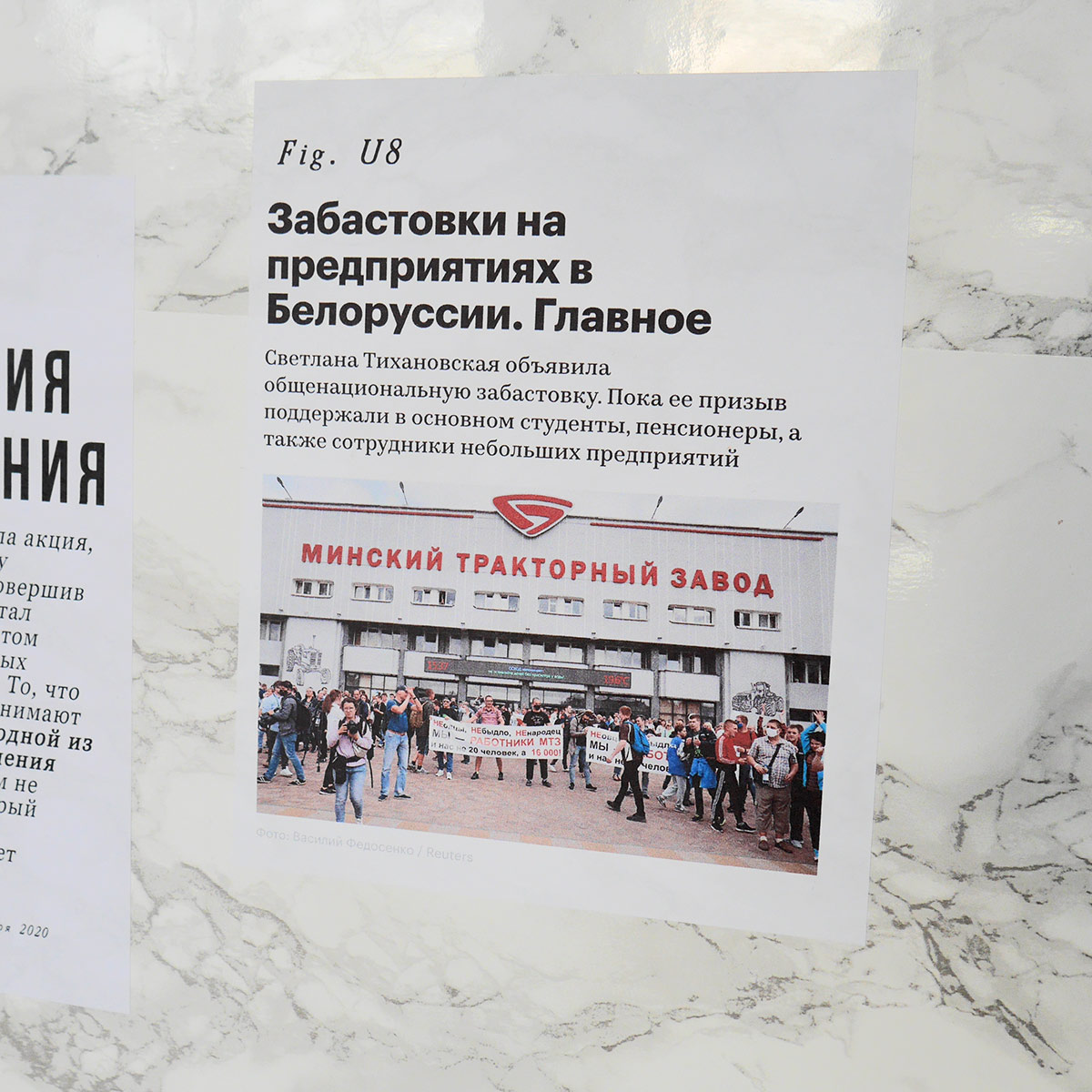
Strikes at Enterprises in Belarus. Main Points
October 26, 2020
rbc.ru
Fig. V8

Photo of Installation #8
November 20, 2020
Final: top view
November 20, 2020
Фото инсталляции #8
20 ноября 2020
Финал: общий вид сверху
20 ноября 2020
Fig. W8
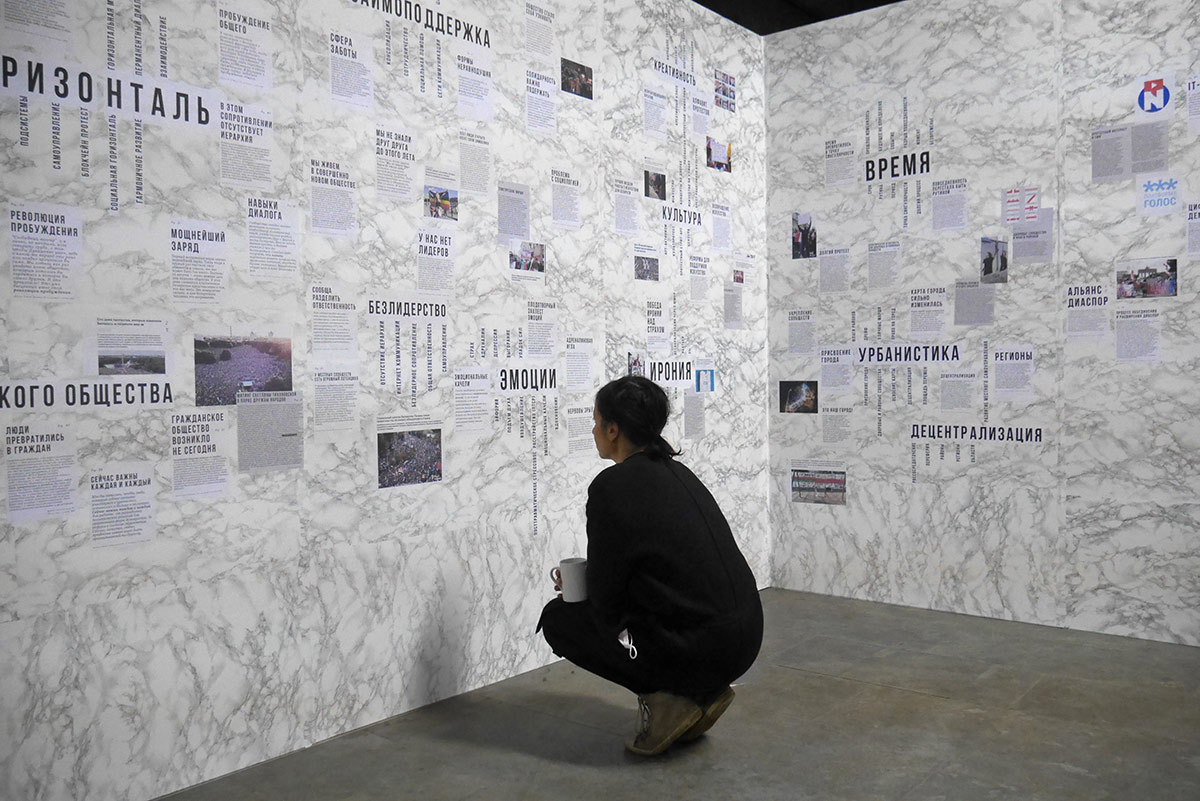
Photo of Installation #9
November 20, 2020
Photo with a visitor on the final 20th day
November 20, 2020
Фото инсталляции #9
20 ноября 2020
Фото с посетительницей в завершающий 20-тый день
20 ноября 2020
Fig. X8
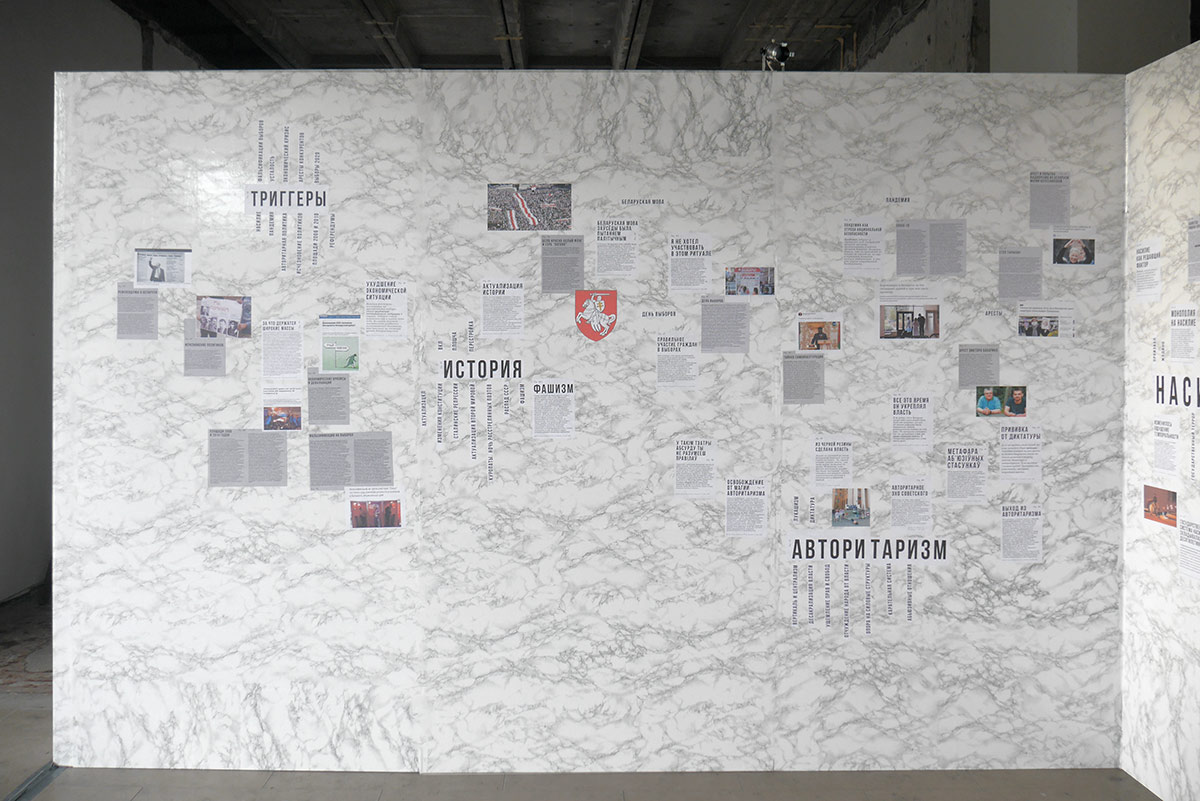
Photo of Installation #10
November 22, 2020
Final: left wall
November 22, 2020
Фото инсталляции #10
22 ноября 2020
Финал: левая стена
22 ноября 2020
Fig. Y8
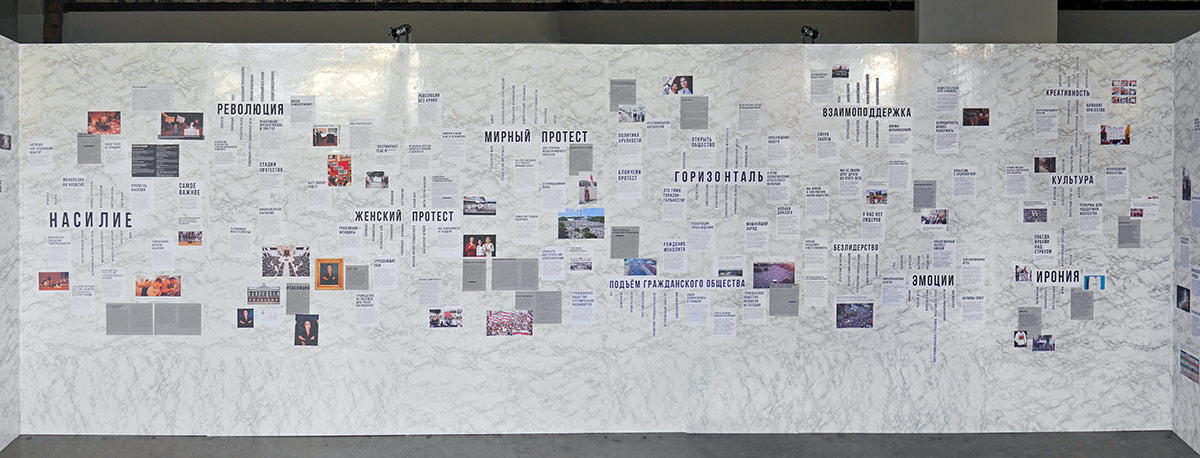
Photo of Installation #11
November 22, 2020
Final: central wall
November 22, 2020
Фото инсталляции #11
22 ноября 2020
Финал: центральная стена
22 ноября 2020
Fig. Z8
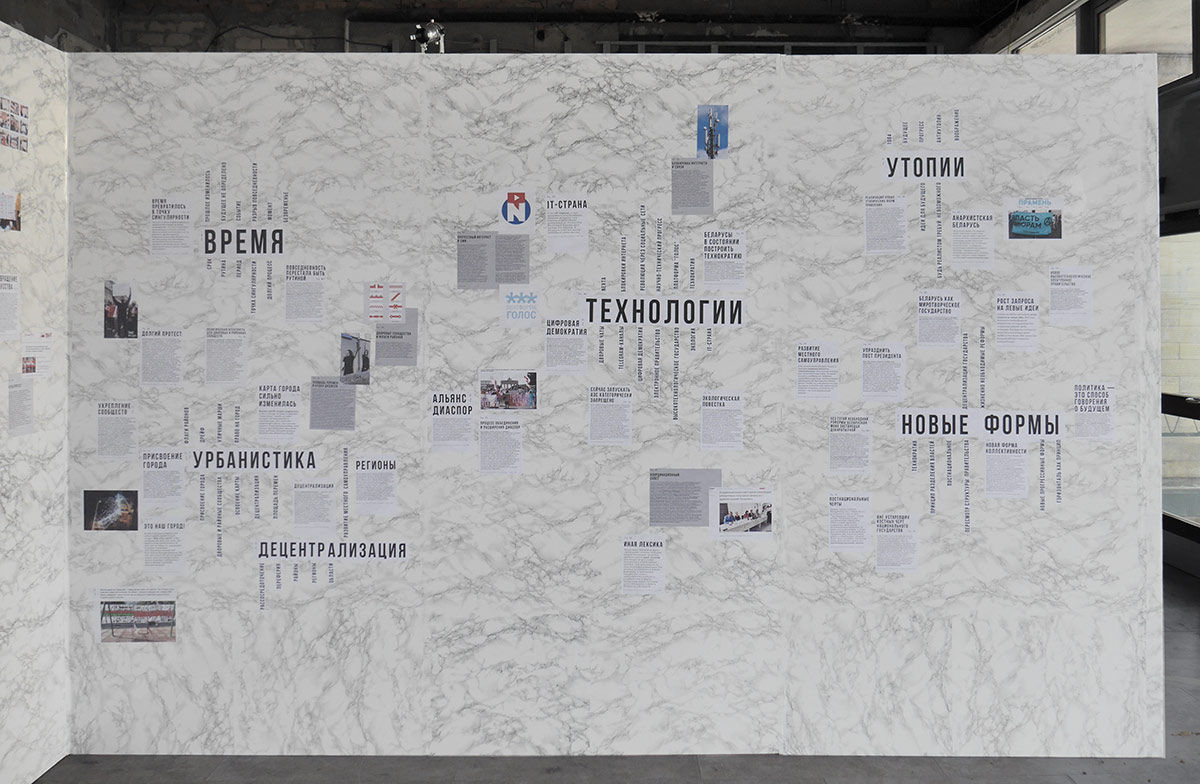
Photo of Installation #12
November 22, 2020
Final: right wall
November 22, 2020
Фото инсталляции #12
22 ноября 2020
Финал: правая стена
22 ноября 2020